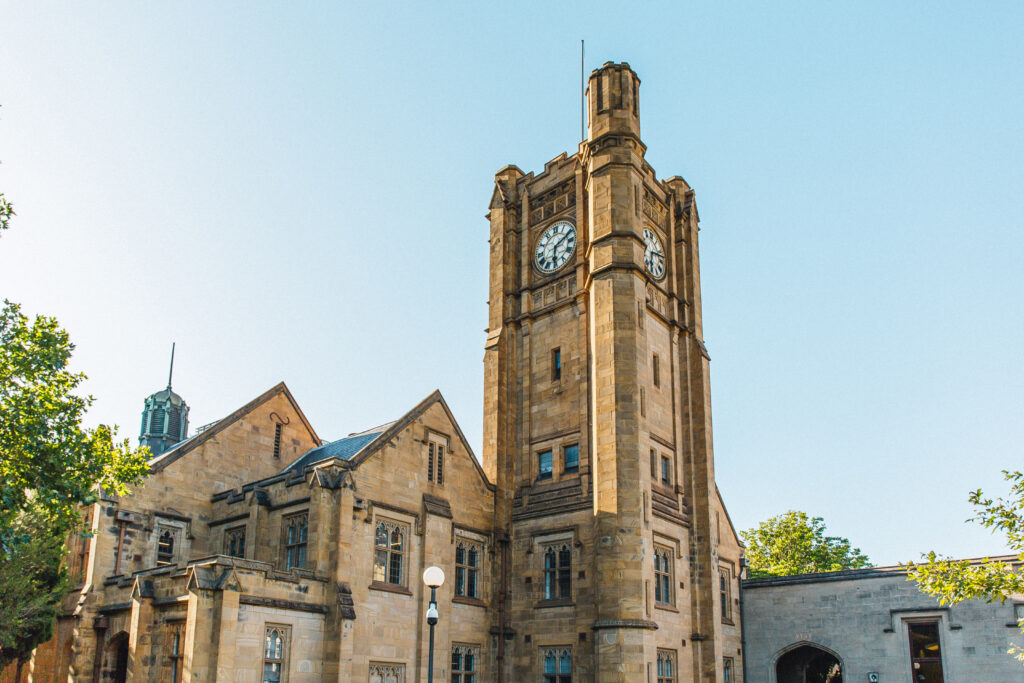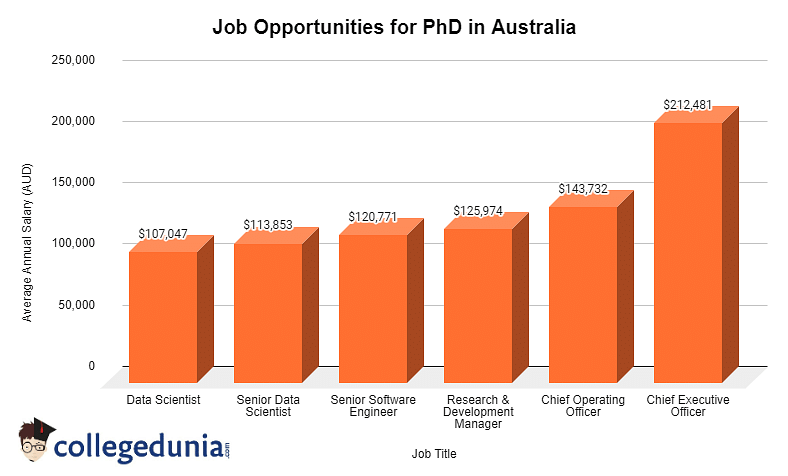
- Doing a PhD in Australia | 2024 Guide
- International

Key Takeways
- Australia offers high-quality PhD programs : With 21 of its universities in the top 300 according to the Times Higher Education Rankings in 2024, Australia provides excellent educational opportunities.
- Understanding the PhD structure is crucial : The PhD process in Australia involves independent research over three years for full-time students, with assessment usually based on the quality of the final thesis.
- Financial planning is necessary : The costs of tuition and living in Australia can be high, but numerous scholarships and financial aid options are available to help offset these expenses.
- The application process involves key steps : Finding a potential PhD supervisor, providing academic qualifications, a research proposal, and references are all part of the application process.
- Opportunities for working while studying : Students are allowed to work up to 40 hours per fortnight during term time, offering the chance to earn extra money for living expenses.
- Australia offers a rich cultural experience : Besides the academic opportunities, international students can enjoy Australia’s vibrant city life, diverse cultural fabric, and stunning natural landscapes.
- Job opportunities and immigration prospects are promising post-PhD : Australia offers numerous opportunities for PhD graduates with different types of visas available, allowing graduates to live and work in Australia for at least four years.
Introduction to Studying PhD in Australia
Are you an international student intrigued by the thought of traversing academic frontiers in the land down under? You are in good company. In 2024, Australia has become a beacon for prospective scholars due to its assortment of excellent PhD programs offered by esteemed Australian universities . This surge of interest isn’t surprising given that 15 of Australia’s universities rank in the global top 250, showcasing a commitment to higher education of exceptional quality.
In fact, the number of PhD completions in Australia has been growing over the past two decades , from about 4,000 to about 10,000 per year!
A PhD in Australia offers not only top-quality education but also a unique academic experience. For instance, Australian doctorates are often assessed without the traditional viva voce—an oral examination—promoting more emphasis on research outcomes. Moreover, Australia offers unique PhD opportunities in areas like marine biology and environmental science, thanks to its diverse ecosystem and landscape. Truly, Australia is the academic adventurer’s paradise.
Choosing a University in Australia for Your PhD
With 43 publicly funded universities and a robust collection of Technical and Further Education (TAFE) institutions, you’ll find no shortage of places to earn your PhD in Australia. Key universities include:
- University of Melbourne
- University of Sydney
- Australian National University
- University of Queensland
- Monash University
These universities contribute to the staggering 21 Australian universities in the top 300, according to the latest Times Higher Education Rankings in 2024.
Several university associations such as The Group of Eight, Innovative Research Universities, Regional Universities Network, and Australian Technology Network further contribute to the strength of Australia’s higher education landscape. When it comes to making a choice of university , it is important to consider factors such as the institution’s reputation, subject choice, university structure, cost of living, and cultural experience to ensure a successful and fulfilling study experience.
Understanding the PhD Structure and Duration
The structure of a PhD degree in Australia typically involves an independent doctoral thesis derived from independent research . A full-time PhD in Australia usually takes three years to complete, while part-time studies may span up to six years, allowing for part-time jobs or other commitments.
Uniquely, Australian PhDs do not usually involve a viva voce. Instead, the final work is sent to external examiners who assess the merit and contributions of your research. Thus, the assessment is based on the quality of your thesis and literature review rather than an in-person examination. By factoring in the required hours per week for research, teaching commitments, and university coursework, prospective scholars can adequately plan their time in this doctoral program .
Cost of Undertaking a PhD in Australia
Pursuing a PhD in Australia involves both tuition fees and living expenses . The cost of a PhD for international students is estimated to be between AUD $20,000-50,000 per year. While domestic students (Australians and New Zealanders) pay significantly lower fees, international students must anticipate this financial commitment when considering a PhD in Australia .
Specifically in regards to international students and STEM PhDs, the following should help give you an indication of the type of costs to expect:
- University of Melbourne : The total course tuition fee for a PhD in Science at the University of Melbourne is approximately AUD 63,584 per year. However, international students may also receive Overseas Student Health Cover and a tuition fee offset.
- University of Sydney : The total tuition fee for a PhD in STEM at the University of Sydney is approximately AUD 51,000 per year.
- Australian National University : The total tuition fee for a PhD in STEM at the Australian National University is approximately AUD 52,100 per year.
- University of Queensland : The total tuition fee for a PhD in STEM at the University of Queensland is approximately AUD 48,040 per year. In addition, HDR students are required to pay a student services and amenities fee of AUD 78 for full-time students and AUD 59 for part-time students.
In terms of cost of living , Australia is one of the most expensive places globally, surpassing both the UK and the USA. The living costs are estimated to be at least AUD $21,041 per year. This includes accommodation costs —potentially over AUD $2,000/month for an apartment in a city centre like Sydney—along with the cost of food (typically AUD $500/month) and travel expenses ranging between AUD 90-325 per week. The Australia Tuition costs coupled with these living expenses necessitate careful financial planning for prospective PhD students.
Scholarships and Financial Aid for PhD Students
Studying for a PhD in Australia need not break the bank. There are numerous PhD scholarships and other types of financial aid available to help offset costs. Universities and the Australian government offer generous funding options . Additionally, potential scholarships are available from diverse sources including university scholarships, government incentives, and specific programs like the Research Training Program .
It’s important to note that eligibility for financial aid and scholarships can depend on your origin, status, and place of study. For example, international students from specific regions might be eligible for the prestigious Australia Awards Scholarships . Also, the University of Sydney has a specific Sydney International Scholarship scheme for talented overseas students.
Due to the competition for these funds, it’s wise to research a broad range of scholarships and apply for more than you think you might need. Remember, every bit of aid you receive lessens the financial load, allowing you to focus more on your research.
The Application Process for a PhD in Australia
Applying for a PhD in Australia involves several key steps and meeting various eligibility criteria. First, you’ll want to reach out to a potential supervisor . This should be a lead researcher of a project or research group that aligns with your interests. You will need an expression of interest from this supervisor to begin your formal application .
The application process usually requires evidence of qualifications, a research proposal, a personal statement, and academic/professional references. Entry requirements typically include a Bachelor’s and Master’s honours degree in a relevant subject. For UK/Ireland applicants, the free Study Options service is available to help navigate this process.
Most applications include a possible interview via video-conferencing. While there is no strict application deadline , it is advisable to apply at least four months before your intended start date. The admission process can be completed through the university website or via agents in your home country.
Every university has its own application process, so carefully check the requirements. Your application form should include academic records and personal documents, and some universities may require confirmation of your eligibility to enter Australia. Lastly, understand the fee structure and be prepared to pay an application processing fee (ranging from AU $50 to AU $150).
The PhD Student Visa Process in Australia
To study in Australia, you will need a Student Visa ( subclass 500 ). Visa requirements include being enrolled in full-time study, having confirmation of enrolment, and having sufficient financial resources (AUD $21,041 per year). English language requirements are specific (IELTS – 6.5, TOEFL – 85, CAE – 176, PTE – 61), and you will need health insurance that meets Overseas Student Health Cover guidelines.
The Student Visa cost is AUD $650, with 75% of applications processed within 25 days. After graduation, the Temporary Graduate Visa (subclass 485) allows PhD graduates to stay for up to four years, extending to six years from July 2023.
Following Covid-19, Australian student visa requirements were relaxed until 30 June 2023, with work hours for overseas students extended to 48 per fortnight during semesters. Additionally, over 70 types of visa exist, including working and skilled visa categories and employer-sponsored visas for international students about to graduate.
Working While Studying: Opportunities and Regulations
While in Australia as a student, it’s not all about studying. You also have the opportunity to work part-time. Students can work up to 40 hours per fortnight during term time, and unlimited hours during holiday periods. These regulations offer you a chance to gain work experience, meet new people, and earn some extra money for your living expenses. Remember to balance your part-time jobs with your study commitments, ensuring you’re successful both at work and in your studies.
Life as an International PhD Student in Australia
In Australia, your journey as an international student does not confine to the corners of an Australian university campus. You’ll experience a vibrant city life from the bustling city centres of top student hubs, like Melbourne and Sydney, to quieter yet enriching atmospheres of Brisbane, Adelaide, Perth, Canberra, and Gold Coast – all featuring in the top 100 student cities globally.
Housing is one of the foremost aspects you would think about, right? Australia offers varied options including university-provided accommodation, managed student accommodation, and private renting or leasing. Universities and government-run services extend their hands with student support services dedicated to international students, ensuring that you never feel left out.
Moreover, student organisations represent international students at state, city, and university levels. You’re not just a PhD student in Australia, but a part of the diverse cultural fabric.
Take your time to explore Australia’s urban attractions like the captivating Sydney Harbour, Melbourne’s cultural centres, stunning Gold Coast beaches, and the enriching museums of Brisbane. Intrigued by history? Perth’s historical sites in Western Australia are a must-visit!
Remember, South Australia and other parts of the country can be significantly distant, often requiring internal flights. However, cities are usually walkable with efficient local transit systems.
Australian Culture for International PhD Students
Australia’s rich culture reflects a beautiful blend of Western traditions, indigenous heritage, and unique geography. As an English speaking country , Australia offers an environment where international students can easily adapt. Its reputation for stunning natural landscapes and diverse wildlife offers a tranquil escape from rigorous academic routines. From the Great Barrier Reef to the vast Outback, there’s a lot to explore!
If you need some inspiration, then the following spots are known to be popular amongst both international and domestic students:
- The Great Barrier Reef
- Uluru-Kata Tjuta National Park
- Blue Mountains National Park
- The Twelve Apostles
- Kakadu National Park
Student Services and Support Mechanisms in Australian Universities
Living away from home can be challenging. Thus, Australian universities provide a vast array of student support services dedicated to international students . This ranges from academic assistance, mental health services to career guidance. Government-run services also play a crucial role in ensuring your well-being.
| Service | Description | |
|---|---|---|
| 1. | Counselling Services | Provides support for stress management, relationship problems, anxiety, and other personal issues. |
| 2. | Academic Support | Offers guidance in writing, research, and study skills. |
| 3. | Health Services | On-campus clinics providing basic health care services. |
| 4. | Career Services | Provides guidance on career exploration, job search strategies, and resume reviews. |
| 5. | International Student Services | Provides support specifically for international students, including visa advice and cultural adjustment. |
Several student organisations represent overseas students on different levels, fighting for your rights and ensuring a conducive academic environment.
Post-PhD Life: Job Opportunities and Immigration Prospects
After obtaining your postgraduate degree , what’s next? Australia offers numerous opportunities and career paths for PhD graduates. The post-study graduate visas allow you to live and work in Australia for at least four years.
Job opportunities, though concentrated in cities, are varied. They range across businesses, government, and the nonprofit sector – offering you a chance to use your academic career knowledge and gain professional experience . However, keep in mind that immigration rules can limit opportunities unless qualifications match identified skill shortages.
| Type of Visa | Description | |
|---|---|---|
| 1. | Temporary Graduate Visa (subclass 485) | Allows recent graduates to live, study and work in Australia temporarily after finishing studies. |
| 2. | Skilled-Recognised Graduate Visa (subclass 476) | Allows recent engineering graduates from recognised institutions and universities to gain up to 18 months of skilled work experience. |
| 3. | Skilled-Independent Visa (subclass 189) | Points-based visa for skilled workers who are not sponsored by an employer, a state or territory, or a family member. |
| 4. | Employer Nomination Scheme (subclass 186) | For skilled workers who want to work in Australia and have been nominated by an Australian employer. |
Conclusion: Is Undertaking a PhD in Australia Worth it?
The journey of undertaking a PhD in Australia can indeed be challenging yet enriching. It is not just about the affordable Australia Tuition fees or the potential to study under a distinguished faculty. It’s about personalising your applications, standing out with your academic history, glowing letters of recommendation , and careful financial planning.
The Australian academic year usually starts in March, and most universities have two semesters. From the perspective of a diverse culture, stellar academic opportunities, and a welcoming international student environment – Australia could very well be the best place for your PhD journey.
Browse PhDs Now
Join thousands of students.
Join thousands of other students and stay up to date with the latest PhD programmes, funding opportunities and advice.
Postgraduate research degrees
Our research is driven by the big picture. The University of Sydney is home to leading researchers who are finding solutions to the world's most pressing issues by changing the way they look at them.
We are home to 90 world‑renowned multidisciplinary research and teaching centres that tackle some of the world’s biggest challenges, such as health, climate change and food security. These centres include the Charles Perkins Centre, the Brain and Mind Centre , The University of Sydney Nano Institute , the Sydney Policy Lab , the Sydney Environment Institute , and the Sydney Southeast Asia Centre .
Our interdisciplinary approach means that students are part of a community of scholars that unites experts in fields as diverse as medicine, arts, social sciences, engineering, information technologies and science.
As a researcher at Sydney, you'll work alongside some of the world's brightest and most accomplished academics. You can access high-calibre facilities and unique international partnerships with top-ranked institutions, including Stanford, UCLA, the University of Edinburgh, Utrecht University, Shanghai Jiao Tong University, and the University of Hong Kong.
Types of research degrees
Master's degree by research.
A master's degree by research at Sydney:
- is the second-highest qualification on the Australian Qualifications Framework
- can be a gateway to study at a PhD level
- is usually one to two years full-time or two to four years part-time*
- is awarded based on a supervised thesis, which makes a substantial contribution to the knowledge of the subject concerned.
*Part-time is not available to international student visa holders.
Doctor of Philosophy (PhD)
A PhD at Sydney:
- is our premier research award and the highest qualification on the Australian Qualifications Framework
- comprises of independent research and writing on an approved topic toward a thesis for examination
- may be undertaken in all faculties and divisions, or across disciplines
- is usually 3.5 years of full-time or seven years of part-time* study.
If you’re interested in a Joint PhD program, you need to follow the Doctor of Philosophy (PhD) application steps 1-3. In addition, your proposed supervisor will need to complete a proposal to negotiate a student agreement form. If accepted, you will also be required to sign an individual student agreement. After your student agreement is finalised, you will then be sent an application form for the Joint PhD program.
Please refer to the University's Dual and Joint Degree Policy for full policy details.
Download our Joint PhD programs factsheet (pdf, 116KB) to learn more.
Professional doctorate
A professional doctorate at Sydney:
- allows candidates to pursue rigorous scholarship alongside advancing their practice in many fields
- is usually three to four years of full-time or six to eight years of part-time* study.
Internship opportunities
Grow professionally and academically through a paid 3-6 month internship with an industry partner as you complete your degree.
The University of Sydney has partnered with Australian Postgraduate Research Intern (APR.Intern) to provide domestic and international HDR students with internship opportunities in a range of sectors and disciplines.
A paid internship will allow you to:
- Develop competencies that will contribute to your research
- Gain industry experience, develop skills and build networks
- Enhance your employability
- Earn additional income
HDR coursework
HDR coursework is mandatory for some of our research degrees. HDR coursework adds to your researcher toolkit so you can graduate with a robust set of skills, for a career in academia or industry.
Your faculty may elect to define certain units of study as mandatory for a given degree, or define any other studies as required by the progress evaluation panel of the research project. Refer to the relevant course in the handbook .
Frequently asked questions
Getting started, do i need prior research experience.
Yes, all HDR courses require prior research experience. This is because HDR courses are largely self-driven, requiring pre-requisite research, time and project management skills.
If I have no prior research experience, how can I get started?
If you do not have any previous research experience, there are ways to gain what you need. Both the one-year honours and masters by coursework degrees containing substantial research components are great pathways into research. These courses will allow you to gain the research skills necessary to apply for the PhD.
What is the difference between a Master of Philosophy/Research and a PhD?
The PhD is our premier research award and the highest qualification on the Australian Qualifications Framework. The PhD is usually three years full-time or six years part-time.
The Master of Philosophy/Research is usually one to two years full-time or four years part-time (part-time is available to domestic students only). A PhD thesis is generally around 80,000 words while a master’s thesis is 50,000 words.
How do I find a supervisor?
To browse through the profiles of our researchers and learn about their current and past research, please refer to Find a Researcher . Here, you will also be able to access the publications lists and contact details of our researchers.
My research idea crosses two disciplines – is this a problem?
No. Interdisciplinary research is highly regarded in the world of academia and working across disciplines can be very beneficial in developing and demonstrating different analytical skills. Working on research from two perspectives can also offer insight that you would not be able to achieve from one discipline perspective.
What are the English language requirements for a PhD?
Please check your course page for the requirements of each course. Generally, the English requirements are between 6.0 to 7.0 IELTS overall or equivalent in other accepted English proficiency tests.
How much do HDR courses cost?
There are no course fees for domestic students – fees are covered by the government Research Training Program (RTP) fee offset. However, fees apply to international students. Please refer to the course page for fee details.
What scholarships are available?
We have one of the largest research schemes in Australia. Opportunities include the Australian government-funded Research Training Program (RTP) stipend scholarships, and the University of Sydney and faculty-specific awards. Explore your options .
Degree progression
Do i have to undertake hdr coursework.
It depends on your degree. Your faculty may define certain units of study as mandatory for a given degree. Where this is not the case, you may still have the opportunity to complete units of study that you find useful to support your learning and research.
Can I transfer from the Master of Philosophy into a PhD?
It is possible for students to move to the PhD after the first year of study, if you have made satisfactory progress and if the transfer is approved by your Faculty. It is important to inform your supervisor of your plans early so that you can work on a timeline together to achieve this goal.
Support during your studies
Am i able to work while studying my hdr course full-time.
Yes, you can work during your PhD. How many hours you take on is at your own discretion, and you must ensure that you still allow time for the completion of your research. International HDR students can generally work more hours than coursework students. Please check your individual visa for specific restrictions.
Will the university employ me during my PhD?
There are sometimes opportunities for PhD candidates to engage in paid employment at the University, but this is not guaranteed and is dependent on the Faculty/Department. If opportunities do arise, they may be in the form of teaching, marking, acting as a research assistant, or other roles.
What support services are available to research students?
There is extensive support for research students at Sydney, including 100+ multidisciplinary research and teaching centres.
Other services:
- Library workshops for research skills
- Academic Liasion Librarians
- Research Support Officers
- Careers Centre
- Sydney University Postgraduate Representative Association (SUPRA)
- Learning Hub
How to apply
Find a supervisor.
Search by keyword, location, topic or supervisor name
- 1800 SYD UNI ( 1800 793 864 )
- or +61 2 8627 1444
Student Centre, Level 3 Jane Foss Russell Building, Darlington Campus
Opening hours: 9am to 5pm, Monday to Friday
Prospective students
Facts & figures
Research at Sydney
- Top 20 Ranked one of the world's top universities*
- 100% of our research is ranked at world standard and above by the Australian Research Council
- 100+ multidisciplinary research and teaching centres
- * QS World University Rankings 2025
Research scholarships
Find the right scholarship for you
How to write a research proposal
A guide to preparing a strong research proposal
6 ways to finance your postgraduate study
Find out how to reduce the cost of your tuition fees
Griffith University
Popular sites
Home > International > Plan your move to Australia > Before you arrive > Working while studying
- Working while studying
Plan your move to Australia
- Student visa
- Health insurance
- Where to live
- Health and safety
- Phone and internet
- Bringing your family
- Buddy Program
Complement your study and living experience in Australia
As an international student with a current student visa, you can work while you study, subject to visa restrictions.
Careers and employment service
Our careers and employment service is a great place to start your job search. It provides Griffith University students and graduates with career and employment information including part-time, casual and degree-related job opportunities, career development services and employment resources. Learn about work permits, hours you can work, wages, taxation, workplace rights, and where and how international students can look for work.
Careers and employment

Talk to our students
Speak with a current student about their experience at Griffith University and in Australia
Start a conversation
Searching online
The SEEK website lists part-time and casual positions that you can search by industry and location.
Check your visa conditions
If you breach your work conditions, your visa may be subject to cancellation
Visa Entitlement Verification Online
Understanding your visa conditions
You can work while you study at Griffith. However it is important to be aware of your student visa restrictions.
Undergraduate, postgraduate and English language students
From 1 July 2023, work rights for international student visa holders increased from 40 to 48 hours per fortnight. A fortnight means the period of 14 days starting on a Monday. As a student visa holder, you cannot undertake work until the commencement of your program of study in Australia.
The 48-hour per fortnight work limitation applies whilst the university is in session (during teaching weeks). It does not include work that is a mandatory requirement of your program (i.e. Work Integrated Learning (WIL); or voluntary, unpaid work of benefit to the community). Students can work unlimited hours during advertised vacation periods.
It is important that you know your visa conditions, including your work rights. Click the link below to view the work conditions attached to your visa:
Australian Government visa work conditions
Research students
Research students are eligible to work in Australia. The Australian Government allows students who are enrolled in a masters by research or doctorate program to work unlimited hours, however, Griffith University research students (including scholarship recipients) are only permitted to undertake limited paid employment.
Griffith University work restrictions
Your rights
Australia has a national industrial relations system that protects your rights at work
Fair Work Ombudsman
Tax File Number
Before you begin working in Australia, you will need to apply for a Tax File Number as you will need to give this to your employer to avoid paying the highest tax rate.
Find out more
You will need to complete a yearly tax return as you may be eligible for a partial refund. Tax returns must be lodged by 31 October for the previous financial year, which runs from 1 July to 30 June.
Lodging a tax return
Do you have a question? Get in touch with us
- Share on twitter
- Share on facebook
Australia extends post-PhD work visa to six years, others to four
Almost 400 bachelor’s and master’s courses attracting enhanced post-study rights named as term-time working hours limit extended.
- Share on linkedin
- Share on mail

Overseas graduates of almost 400 Australian bachelor’s and master’s courses will be eligible for an extra two years of post-study work rights from July, while doctoral graduates in any discipline will qualify.
The Australian government has announced that credentials in more than 120 occupations will earn international students the extra work rights that it promised them during last September’s Jobs and Skills Summit.
The pledge, which applied to foreign graduates with “select degrees in areas of verified skill shortages”, raised post-study work rights to four years for bachelor’s qualifications, five years for master’s and six years for PhDs.
And on the recommendation of a working group of civil servants and sector representatives, the government has decided to grant the extra two years to all PhD graduates “regardless of field of study”.
This will increase Australia’s human capital “in areas of key sovereign capability” while cultivating “a larger pipeline” of top international students, the government explained.
Canberra has accepted all of the working group’s 20 recommendations either wholly or in principle. They include a proposal to boost the number of hours of paid work that foreign students are entitled to undertake during term time.
Until early 2022, when it was removed as a temporary Covid measure, a 40-hour fortnightly restriction had been applied to international students’ working hours. When the limit is reimposed in July, it will be raised to 48 hours.
This means that international students can work the equivalent of three full days a week – an amount that allows students enough time to study while supporting themselves adequately, the government explained .
The boost might ease the students’ resentment at having their working hours limited again after 18 months of unrestricted employment rights, while alleviating employer concerns that the reimposed cap could exacerbate staffing shortages.
But critics say liberal work rules are robbing foreigners of learning time while turning student visas into a scheme for attracting low-skilled workers .
The home affairs minister, Clare O’Neil, said the government was trying “to utilise skilled migrants via enhanced training and better targeted, less exploitative programmes for temporary visa workers and students”.
Jason Clare, the education minister, said Australia had “the second highest skills shortage” in the developed world. “Businesses are screaming out for skilled workers, particularly in the regions,” he said.
“These skilled workers…can use the skills they’ve gained in Australia to help fill some of the chronic skills shortages we have right now. [This] will make Australia more attractive as a study destination.”
Universities Australia said there was a “clear need” for international graduates “to complement our home-grown workforce and spur productivity and economic growth”.
“The decision to extend working rights for PhD students, in particular, will provide a significant boost to the development of Australia’s knowledge economy,” said chief executive Catriona Jackson.
Register to continue
Why register?
- Registration is free and only takes a moment
- Once registered, you can read 3 articles a month
- Sign up for our newsletter
Or subscribe for unlimited access to:
- Unlimited access to news, views, insights & reviews
- Digital editions
- Digital access to THE’s university and college rankings analysis
Already registered or a current subscriber? Login
Related articles

Can Australia win the global tug of war for international students?
As it emerges from its Covid isolation, Australia is rolling back restrictions on foreign students and graduates in the hope of ushering more of them into its depleted workforce. But amid competitive and political pressures, has it found the best balance between work and migration rights, asks John Ross

Australia maintains uncapped work rights for foreign students
Much vaunted summit also resolves that graduates should be allowed to work for longer after finishing their degrees

Southampton gets go-ahead for first British campus in India
University to offer both undergraduate and postgraduate programmes across range of subjects from outpost in Delhi

Will branch campuses make Greek higher education flower?
A new law permitting foreign universities to set up Greek outposts is seen by some as a first step to transforming a very statist system. But with doubts over the law’s constitutionality compounding the usual uncertainties of overseas ventures, will there be much interest, asks Emily Dixon
Featured jobs
Ask - /faq/1046/part-time-phd-enrolment/
Part-time phd enrolment, can i enrol in a phd part-time.
Yes, it is possible to enrol in a PhD part-time in some circumstances and subject to your department's approval.
Note: scholarship recipients usually have to be enrolled full-time. International students on student visas can only enrol part-time if there are compelling or compassionate circumstances .
For further information on changing to part-time enrolment, visit the Graduate Research Hub .
About this answer
Last updated: Dec. 10, 2021, 5:39 p.m.
- Responding to an Offer
- How to get your student card
Most popular FAQs
- Accessing student email
- Fee Account Statement
- How can I check my fees and payments?
- Fees- Statement of Liability
- Changing your name and details
You might find some of these answers helpful
- Scholarships - Part Time Study
- Full Time/Part Time
- PhD by correspondence
- Part-Time Study
ask.unimelb Live Chat
Submit an enquiry, submit a faq feedback, update your password.

Doctor of Philosophy

As a Doctor of Philosophy (PhD) candidate, you’ll complete a substantial program of independent and original research in your chosen field of study. A PhD prepares you for a range of careers - from academic to industry and is the highest degree qualification available.
- 3–4 years (full time) minimum commitment of 35 – 40 hours per week or
- 6–8 years (part time) minimum commitment of 15 hours per week.
- Offered in all Faculties
- A thesis of no more than 100,000 words.
Entry requirements
Future careers.
- Fees & costs
UNSW undertakes world-class research that tackles some of the greatest challenges facing society today. When you join the UNSW research community, you join a passionate collective of people who are using research to transform minds, transform lives, and transform the world.
UNSW will support you to develop the skills and expertise you need to make a difference in your field. We are committed to providing you with an unmatched PhD experience that includes outstanding research training and mentorship, world-class supervision, and access to research environments defined by excellence and collaboration.
You will receive advanced specialist research training and produce a thesis that provides evidence for independent thought, critical analysis, and expert knowledge of the discipline in an international context. In some disciplines, creative work may form part of the thesis.
Find information about individual PhD programs and codes on the UNSW Handbook .
Learn about the graduate attributes and learning outcomes for UNSW higher degree research programs here .
The minimum requirement for admission to a PhD is:
- A UNSW Bachelor degree with first or upper second class Honours from UNSW; or
- a completed Master by Research from UNSW with a substantial research component and demonstrated capacity for timely completion of a high quality research thesis; or
- an equivalent qualification from a tertiary institution as determined by the Faculty Higher Degree Committee (HDC)
The minimum requirement for UNSW Scholarship with admission to a PhD is:
- a four year Bachelor degree with first or upper second class Honours from an Australian institution or equivalent research qualification as above.
You may think of yourself as a student, but we think of you as a professional researcher in the early stages of a long and vibrant career.
UNSW will provide you with the skills and expertise to pursue a range of career pathways after you graduate, from academia to industry.
As a PhD candidate, you’ll have access to a wealth of opportunities to work with and alongside industry through industry PhD programs to internships and mentorships .
You’ll also have access to the most comprehensive student entrepreneurship program in Australia, that can help you develop your ideas, raise capital and launch a startup.
Fees and costs
The costs associated with enrolment in a research higher degree program vary depending on whether you are a domestic or international candidate. Learn more about the fees and costs here .
Have questions? Contact us
+61 2 9385 5500

A Guide to Doing Your PhD in Australia

Sign up to our newsletter!
The newsletter signup widget on posts
- Name * First Last
- Comments This field is for validation purposes and should be left unchanged.
If you’re an international student who has completed higher education studies, you might now be considering studying a doctorate degree, also known as a PhD. In Australia, this is the highest level of study and, once completed, can unlock doors to better employment, higher wages, and industry recognition.
Here’s a handy guide on how to apply, what to expect, and where to find further information for your exciting next step.
What is the difference between honours, a master ’s and a PhD?
An honours is an extra year of study in Australia. To qualify you need to have completed your undergraduate degree, otherwise known as a bachelor’s degree, to a high standard. This is often considered a stepping stone to further postgraduate study.
Graduates with a bachelor’s degree might consider a graduate certificate, which usually takes one semester of full-time study and can help you specialise in your chosen career path. One step up from a certificate is a graduate diploma. This type of study takes one year of full-time study and can often be continued on from the graduate certificate.
A master’s by coursework is similar to a graduate diploma but takes a little longer and is regarded as a higher qualification. In most cases, you need a relevant bachelor’s degree; however, in certain circumstances, extensive relevant work experience might be accepted instead. This type of course typically takes 18 months to complete. A master’s by research takes two years of full-time study and is based on a research project supervised by a university academic.
A doctorate by research or a PhD is the highest level of study offered in Australia. A PhD requires submission of a thesis that is assessed by examiners who determine whether the research is worthy of the qualification. A PhD student must show through their thesis that they have made a significant contribution to their field. Once graduated, the candidate may use the title of Doctor.
How does a PhD work in Australia?
A PhD in Australia is usually studied over the course of three years. While some students take a little longer, extensions are subject to funding, as well as other important factors. Domestic students may have the option to study part-time but as an international student, you must study full-time in order to be eligible for a student visa .
According to the Australian Government , fees to study a PhD range from A$19,000 to A$78,000 per year, depending on the education provider. There is a chance you may not have to pay the full amount if there is funding available, which is common in Australia. Most universities have funding for promising PhD students set aside. Get in touch with your chosen university directly to find out what scholarships are available to international students. The Australian Government also runs Destination Australia , which funds eligible education providers in regional areas to offer scholarships to both domestic and international students. The government also offers the Research Training Program for participating universities.
International students also need to consider the cost of living while abroad to qualify for their visa. You’ll need at least roughly A$21,041 for each year of your study in your bank account in order to be granted a visa.
Do I need honours to apply for a PhD?
In most cases you will need an undergraduate degree with a minimum of Second Class Honours (Division A) – also known as ‘upper second-class’ honours – to apply for your PhD to demonstrate you have significant research experience. However, many education providers offer research-based qualifications to give you this experience if you didn’t complete an honours degree originally.
What is the basic structure of a PhD?
PhDs in Australia are usually research-based and, while they may contain other aspects, the focus of your studies will be on working towards your doctoral thesis.
In general, a PhD begins with a literature review that collects, analyses and summarises the current research published on your chosen subject. This then provides the basis for designing, implementing and analysing your own research that you’ll write about for your thesis.
In Australia, you are not required to undergo a viva voca , which is an assessed oral exam in defence of your research topic, method and predicted results. Instead, you are assessed solely on your thesis.
How do I apply for a PhD?
To apply for an Australian PhD, the first step is to contact a university academic working as a supervisor for PhD projects. You contact them, usually about four months before you wish to commence your studies, with the research topic you would like to propose. The person you choose should be the lead researcher for the institution you wish to apply to, in the relevant field you wish to study.
Once you have what is known as an ‘expression of interest’ from a provisional supervisor, you can begin your formal application to the university. Most universities won’t consider an application without an expression of interest from a supervisor, so make sure you have this first.
What else do I need to know?
To study as an international student in Australia, you must have a student visa (subclass 500) from the Australian government. Unless you are exempt, the application fee for this visa is AUD$710. You can read more about student visas and their requirements here .
Australian PhDs are delivered in English and have language skill requirements. There are various tests you can take to verify your English language skills including the IELTS, CAE and PTE. The score you need is usually specified on the universities website and will depend on the test you take.
International students must have Overseas Student Health Cover (OSHC) in order to be granted their student visa. There are a variety of providers to choose from, including many universities, but the policy you choose must adhere to the Overseas Student Health Cover guides. Explore your options in greater detail here .
The new international student working limit of 48 hours every fortnight does not apply to international students who are pursuing a doctorate or a master’s degree through research. These students are not restricted in terms of the number of hours they can work. However, your actual work hours should align with your study requirements and also require approval from your academic supervisor. This is to ensure that your employment does not interfere with your primary objective of completing your academic research.
PhD study is an excellent way to enter the Australian workforce and graduate visas are available that can entitle you to stay in Australia for up to four years after you have finished your PhD. In other words, if you have dreams of both furthering your education and settling long-term in Australia, a PhD could be the perfect way to make those dreams a reality.
Sarah Price
Originally from the UK, Sarah has worked as a freelance writer for nearly 10 years, both at home and now in Perth where she lives. Once an international student in South West WA herself, she loves to help new students feel welcome, confident, and ready to make the most of their study abroad. Having lived in Perth and explored a lot of WA, Sarah knows just how wonderful it is to discover this beautiful state.
Related Articles

Bringing Your Family to Australia? A Complete Guide For International Students

Understanding the Australian Grading System

A Guide to Universities in Victoria
- PhD Study in Australia – 2024
Studying abroad in Australia has a lot more to offer than sun, sea and sand. With world-class research centres and internationally ranked universities, the country is also a vibrant hub for research and scholarship.
Australian universities carry out pioneering work in ecology, renewable energy, antibiotic therapy and more. So, whether you want to study marsupials or medicine, Australia is a place where your PhD could really make a difference. And you can still go surfing too!
Why study a PhD in Australia?
- Internationally renowned research – 15 of Australia's world leading universities rank in the global top 250.
- Generous funding options – It's unlikely you'll have to pay for your entire PhD out of your own pocket. Many PhD scholarships and other funding opportunities are available from universities and the Australian Government.
- Unique PhD opportunities – From Marine Biology at the Great Barrier Reef to Anthropology at Uluru, some doctoral research can only be completed in Australia.
- Generous post-study visas – Australia values its PhD graduates. Your doctorate could allow you to live and work in the country for at least four years.
- No viva – Not keen on the thought of defending your thesis during an oral exam? It's quite common for Australian doctorates to be assessed without the traditional PhD viva voce .
| PhD Study in Australia - Key Details | |
|---|---|
| 43 | |
| 16 | |
| (1850) | |
| 458,279 | |
| 3 years | |
| AUD $20,000-50,000 (USD $13,470-33,670) | |
| February to November | |
Find a PhD in Australia
Ready to start browsing some current PhD opportunities in Australia ?

A guide to everything you need to know about working in Australia both during and after your postgraduate degree.

You can earn up to AUS$760 per fortnight while studying a postgraduate course in Australia. Find out about the Austudy payments including eligibility criteria, applications and amounts.

A quick guide covering everything you need to know about driving in Australia as an international student, including licensing, costs and more.

Australian universities have two prominent intakes. In this guide, we take a look at the February intake. We have information about important dates and application timelines
Our postgrad newsletter shares courses, funding news, stories and advice
FindAPhD. Copyright 2005-2024 All rights reserved.
Unknown ( change )
Have you got time to answer some quick questions about PhD study?
Select your nearest city
You haven’t completed your profile yet. To get the most out of FindAPhD, finish your profile and receive these benefits:
- Monthly chance to win one of ten £10 Amazon vouchers ; winners will be notified every month.*
- The latest PhD projects delivered straight to your inbox
- Access to our £6,000 scholarship competition
- Weekly newsletter with funding opportunities, research proposal tips and much more
- Early access to our physical and virtual postgraduate study fairs
Or begin browsing FindAPhD.com
or begin browsing FindAPhD.com
*Offer only available for the duration of your active subscription, and subject to change. You MUST claim your prize within 72 hours, if not we will redraw.

Do you want hassle-free information and advice?
Create your FindAPhD account and sign up to our newsletter:
- Find out about funding opportunities and application tips
- Receive weekly advice, student stories and the latest PhD news
- Hear about our upcoming study fairs
- Save your favourite projects, track enquiries and get personalised subject updates

Create your account
Looking to list your PhD opportunities? Log in here .
- Enquire Now
- About SI-Australia
- SI-Australia Office
- SI-Australia Osaka
- All Global Offices
- Course Search
- Application Services
- Free Service
- Top Universities Service
- Visa Service
- Premium Service
- PhD Service
- Australia Application Process
- Australian Education System
- Australia University Rankings 2025
- All Australia Study Information
- University Profiles
- College Profiles
- University Subject Guides
- Study Options
- Study Blogs
- Study English

Book your Free Consultation
A member of the SI-Australia team will be in touch within 24 hours to arrange your initial consultation with one of our education experts.

- Australia Study Blog
- Part-Time Jobs in Australia

Part-Time Jobs in Australia for International Students
Last updated: 12 February 2024 Student Finance
Working part-time can sound counterintuitive, yet rewarding as it enables you to be financially independent. If you are looking for part-time jobs while studying abroad, Australia is the third most popular educational destination, attracting millions of students annually. It has a rich cultural heritage, world-class education, and many employment opportunities for part-time jobs in Australia for international students.
According to a Department of Education for International Students in Australia survey, ninety per cent of international students are content with their living and educational experiences. This is because students in Australia have access to a diverse range of part-time jobs that allow them to fund their studies while also developing information and skills that will be valuable when studying overseas.
Learn more about combining study with part-time jobs in Australia below.

Benefits of Part-Time Jobs in Australia
Working part-time in Australia can benefit you, especially in building your academic and professional experience. Here are five reasons why you should work part-time while studying in Australia .
1. Become financially independent
Working part-time gives you brownie points to earn extra money, helping you cover your educational, transportation, and grocery expenses. This financial independence can reduce the family burden and personal savings.
2. Skills Development
Strong interpersonal skills and high-skill experience make for an exceptional career profile. Working part-time improves one's ability to lead, communicate, collaborate, solve problems, and manage time effectively. These abilities are critical for success in the job, in school, and in one's growth.
3. Cultural Exposure
Student part-time jobs in Australia offer opportunities to build a professional network within your field of study or in other industries. Networking can open gates for future career opportunities, internships, and potential collaborations in academic fields.
4. Building Personal Growth
Another advantage of working part-time in Australia is it can contribute to personal growth and independence. It challenges navigating a new environment, making decisions, and adapting to different situations.
5. Resume-Gap Filling
If there are breaks in your academic career, working part-time can help fill those gaps on your resume. This indicates that you are actively engaged and productive during your time abroad.
Part-time employment is defined as working less than 30 hours a week. According to the Australian Bureau of Statistics, here is some significant information about part-time employment in Australia.
| Part-time employment rate | 30.2% |
| Total Part-timers (as of Dec 2022) | 4,304,800 |
| High-demanding job sectors | Retail sales, Education, Management, and Hospitality |
| Minimum wage | $23.23 hourly |
| Total monthly hours of work | 20 hours per week |
| Part-time jobs in Australia | Retail sales, tutor, driver, call center worker, etc. |
International students can only work once the session begins. Also, students pursuing post-graduate research can work unlimited hours when the research work or doctoral thesis begins. In addition, students completing the Australian study requirement can apply for a post-study work permit in the undergraduate stream. Students enrolled in ELICOS cannot apply for a post-study work permit.
Types of Part-Time Jobs in Australia
Finding the right part-time job in Australia is relatively easy if you have the right communication skills, meet the eligibility, and have the proper networking. A good CV or resume makes a positive first impression on the organisation and helps you bag the job interview.
Many Australian universities assist students in creating and formatting resumes that list students' skills, experience, education, and interests. They also provide on-campus and off-campus part-time job opportunities for international students. Here are the types of part-time work that students can opt for while studying.
- Travel agent - It is one of the highest-paying part-time jobs in Australia. It’s a good fit for those who want to travel and explore new experiences. The job responsibilities include talking to people about travel destinations in Australia and helping them plan schedules, bookings, etc. One must have good communication and sales skills with travel experience and fluency in English.
- Sales representatives - Being a sales representative is a great way to build confidence. They are responsible for selling to customers, meeting customer demands, setting appointments, and generating sales and leads. The typical rate ranges between $20 to $30 per hour.
- Customer service - is one of Australia's hardest and highest-paying jobs; the average salary is $26 per hour. Among the duties are addressing client complaints, troubleshooting issues, and upholding positive customer relations. This is a great part-time position to improve your communication abilities.
- Personal tutor - If you are good at pre-university subjects, you should opt for tutoring. The job responsibilities include preparing lessons, working with students to strengthen their basics on subjects, assigning them homework, evaluating students' progress and performance, etc.
Eligibility Criteria
- Must have a valid Australian student visa
- Students must have an Australian government-approved full-time study program.
- Applicants must fulfill the minimum attendance requirements
- One should have applied for student health insurance
Top Cities in Australia to Work
Australia is among the best countries for international students to live and work. Here are some of the best cities in Australia for part-time jobs.
|
|
|
|
| Adelaide, South Australia | Apple, Westpac Group, Deloitte, Commonwealth Bank of Australia | $1800 - $2200 |
| Brisbane, Queensland | Dominos Pizza, Suncorp, Star Entertainment Group | $2100 - $2300 |
| Canberra, Australian Capital Territory | Accenture, IBM, PwC | $1700-$2000 |
| Melbourne, Victoria | IBM, Apple, Chevron | $1700-$1900 |
| Perth, Western Australia | Accenture, PwC, BHP, Apple | $1900 -$2200 |
Study in Australia
If you want to study in Australia and work part-time, contact SI-ANZ today for a free consultation on your future.

" SI-Australia helped me successfully apply to study business in Australia and I cannot thank them enough for their support. They assisted me with each step, ensuring I was aware of all my options in terms of program and university selection, making the process totally stress free "
Isabella Ramos Business and Management

Leading Universities in Australia

©2024 SI-Australia | All rights reserved | Privacy Policy


- Study Abroad Get upto 50% discount on Visa Fees
- Top Universities & Colleges
- Abroad Exams
- Top Courses
- Read College Reviews
- Admission Alerts 2024
- Education Loan
- Institute (Counselling, Coaching and More)
- Ask a Question
- College Predictor
- Test Series
- Practice Questions
- Course Finder
- Scholarship
- Netherlands
- New Zealand
- Study Guide
PhD in Australia: Universities, Admissions 2024-25, Fees, Scholarships, Job opportunities

Veda Burman
| Updated On - Apr 30, 2024
PhD in Australia or Higher Degree Research (HDR) is a 3-5 years, full-time program offered across the top universities. Australia has emerged as a centre of excellence for PhD with growing research opportunities across modern fields like renewable energy, biotechnology, and information technology among others. For admission to the top PhD universities in Australia , you require a relevant bachelor’s and master’s degree and a research proposal of 300-1000 words.
Australia currently houses 9 of the top 100 universities in the world offering PhD. International students tend to select PhD in Australia due to the affordability, and acceptance of unconventional English proficiency exams like PTE and Duolingo English Test. The tuition fees for PhD in Australia can range anywhere between 3,355 to 219,299 AUD (1.80 lakhs to 1.17 crore INR). After PhD, you can pursue job opportunities in Australia as a Research Scientist, R&D Manager, Research Officer and in related roles.
|
2.1 2.2 2.3 2.4 2.5 2.6 2.7 2.8 2.9 3.1 6.1 6.2 7.1 |
Why Study PhD in Australia?
- English Proficiency Test Scores Accepted in Australia: Unlike countries like the USA, and UK, the universities in Australia are flexible in accepting the scores of PTE or DET , other than the conventional IELTS, and TOEFL iBT. This saves the cost of English proficiency exam for international students.
- Research Facilities in Australia: The top universities in Australia offer state-of-the-art research facilities across a diverse range of Higher Degree Research (HDR) disciplines.
- PhD Scholarships in Australia: Australia opens a wide variety of PhD scholarship opportunities for international students. You can get up to full tuition fee waiver with a monthly PhD stipend in Australia for your personal expenses.
- High Return on Investment: After completing a PhD in Australia, graduates annually earn an average salary of 109,000 AUD (58.40 lakhs INR), reflecting a high return on investment.
Top PhD Programs in Australia
Some trending PhD courses in Australia according to the fields of study and respective universities offering those programs are as follows:
PhD in Computer Science and Engineering in Australia
|
| Curtin University |
| University of Tasmania | |
| RMIT University | |
|
| University of Tasmania |
| James Cook University | |
| Murdoch University | |
| PhD in HCI in Australia | The University of Melbourne |
| Monash University | |
| The University of Sydney |
PhD in Renewable Energy in Australia
| PhD in Australia in Photovoltaics | The University of Sydney |
| University of New South Wales Sydney | |
| Australian National University | |
| PhD in Biotechnology in Australia | RMIT University |
| The University of Queensland | |
| Australian National University |

PhD in Structural Engineering in Australia
|
| University of Technology Sydney |
| University of New South Wales | |
| University of Melbourne | |
| PhD in Civil Engineering in Australia | Curtin University |
| Monash University |
PhD in Chemistry in Australia
|
| University of Tasmania |
| Deakin University | |
| Flinders University | |
| PhD in Chemical Engineering in Australia | Curtin University |
| Monash Engineering | |
| RMIT University |
PhD in Agriculture in Australia
|
| University of Tasmania |
| University of Melbourne | |
| James Cook University |
PhD in Business in Australia
|
| Curtin University |
| University of New South Wales | |
| Deakin University | |
|
| Australian National University |
| University of Technology Sydney | |
| Deakin University | |
|
| Curtin University |
| University of Tasmania | |
| University of New South Wales | |
| PhD in Business Administration in Australia | University of Canberra |
| University of Technology Sydney | |
| The University of Notre Dame Australia | |
|
| University of Canberra |
| University of Technology Sydney | |
| University of Tasmania |
PhD in Healthcare in Australia
| / PhD Clinical Psychology Australia | The University of Western Australia |
| University of Wollongong | |
| Flinders University | |
|
| The University of Notre Dame Australia |
| Deakin University | |
| Flinders University | |
|
| Curtin University |
| University of Technology Sydney | |
| University of Tasmania | |
| PhD in Public Health in Australia | University of Technology Sydney |
| University of Tasmania | |
| James Cook University |
PhD in Education in Australia
| Program | Universities |
|---|---|
|
| Charles Darwin University |
| Deakin University | |
| Western Sydney University |
PhD in Law in Australia
|
| The University of Sydney |
| RMIT University | |
| Monash University |
Top Universities for PhD in Australia
Australia is home to almost all sorts of universities for PhD programs. There are a plethora of top ranked universities with highly competitive admission policy and stringent admission requirements. A list of the highest ranked universities in Australia for PhD and their respective details of rankings and eligibility criteria is provided below:
| QS World University Rankings 2024 | University | Academic Requirements | English Proficiency Test Score | Additional Requirements |
|---|---|---|---|---|
| #14 | A masters degree in a relevant discipline with 75% | : 6.5 to 7.0 | TOEFL iBT: 79 to 94 | Referee report | Relevant professional experience | |
| #=19 | Official academic transcripts | No bar | Competitive IELTS, TOEFL, accepted | Final research proposal (Up to 2000 words) | Proof of supervisor | CV | Valid passport | 2 referee reports | |
| #=19 | 4 year bachelor’s degree | Masters by research | IELTS: 6.5 to 7.0 | : 90 to 94 | - | |
| #=34 | Master’s degree with a significant research/thesis component | Competitive IELTS, TOEFL iBT or PTE | 2 referee report | |
| #42 | A bachelor's degree, masters degree | IELTS: 6.5 | TOEFL iBT: 79 | PTE: 58 | Research proposal of 2–3 pages | Cover letter | |
| #43 | Bachelors and masters degree with 60% | IELTS of 6.5 and 6.0 | Portfolio | work experience | |
| #72 | Completed an acceptable preliminary program at any recognized institution | 60-70% in English in Indian educational system | Sufficient background and experience in independent supervised research | Approval of research proposal | |
| #89 | Honours degree, PG coursework degree | Competitive IELTS, TOEFL iBT or PTE score | Confirmation of supervisory support | |
| #90 | Senior secondary and tertiary studies comparable to an Australian degree | Satisfactory | IELTS: 7.0 | TOEFL IBT: 94-101 | PTE: 65-72 | - | |
| #=130 | Completion of a Master of Research (MRes) with 75% | A 2-year masters degree with 75% | IELTS: 6.5 | TOEFL iBT: 83 | PTE: 58 | Substantial research project at masters level |
You can select from a wide range of PhD colleges in Australia requiring moderate eligibility criteria for admission. Some of these universities, their respective rankings, and corresponding details are as follows:
| QS World University Rankings 2024 | University | Academic Requirements | English Proficiency Test Score | Additional Requirements |
|---|---|---|---|---|
| #162 | Honours degree and research masters comprising a thesis | IELTS: 6.5 | TOEFL iBT: 86 | Research experience | |
| #=189 | Bachelor or higher degree from a recognised Indian institution | 65% in high school English core subjects | PTE: 58 | IELTS: 6.5 | TOEFL iBT: 79 | Demonstrated research aptitude | |
| #183 | Master degree or bachelor degree with first or upper second class honours | IELTS: 6.5 | Capacity to carry out independent research | |
| #=285 | Masters degree with 70% | IELTS: 6.5 | PTE: 58 | TOEFL iBT: 64 | DET: 120 | Written research thesis | An artefact (creative work or design product) | |
| #=173 | Bachelor with Honours Class 1 or Honours Class II | IELTS: 6.5 | - | |
| #=233 | Masters degree (research) in a related area | IELTS: 7.0 | Research project in a related area | |
| #243 | Bachelor’s with first class honours | A record of research | TOEFL iBT: 79 | PTE: 58 | Proposed research topic | 2 academic referee | CV | 1 potential Griffith supervisor | |
| #242 | Bachelors and masters with over 70% aggregate | IELTS: 6.5 | PTE: 56 | TOEFL iBT: 79 | Professional CV | Details of any publication | Copy of Masters thesis | Research proposal (<300 words) | Proof of age and citizenship | |
| #140 | 4 years full time bachelors degree including a research component with a thesis | IELTS: 6.5 | - | |
| #=307 | Equivalent of an Australian bachelor's degree with upper second class Honours or higher | IELTS: 6.5 | Personal Competency Statement |
Several universities in Australia boast a generous admission process with comparatively easier admission requirements than others. A list of such popular PhD colleges in Australia with generous admission requirements are as follows:
| QS World University Rankings 2024 | University | Academic Requirements | English Proficiency Test Score | Additional Requirements |
|---|---|---|---|---|
| #380 | Australian equivalent Class 1 or 2A honours degree | 75% average | IELTS: 6.5 | TOEFL IBT: 80 | Research experience | |
| #=326 | Honours years Bachelor’s degree or relevant master’s degree | IELTS: 7.0 | TOEFL IBT: 94 | Relevant work experience and research work | |
| #=375 | Honours bachelor’s degree (class 1 or 3) or research master’s or master degree in philosophy degree | IELTS: 6.5 | TOEFL IBT: 82 | Research experience | |
| #529 | First or upper second UG degree or a master’s degree in research | IELTS: 6.5 | TOEFL IBT: 84 | At least 6 months research | |
| #=415 | 2nd class honours bachelor’s degree or a master’s in research | IELTS: 65 | IBT: 86| | 3 years full-time professional experience | |
| #=431 | 1st class or 2nd class Honours bachelor’s degree or master's degree involving research project | IELTS: 6.5 | TOEFL IBT: 90 | Professional experience involving research experience | |
| #=421 | Bachelors degree with honours, masters degree | IELTS: 6.5 | - | |
| #=410 | Bachelors and masters degree | IELTS: 6.5 | Contact with research supervisor | |
| #601-610 | Bachelors degree and masters degree | IELTS: 6.5 | PTE: 58 | TOEFL iBT: 79 | Equivalent of 1 semester of research activity | Comparable levels of research like scholarly publications | Research proposal of 500-1000 words | |
| #711-720 | 4 year bachelor’s degree with 70% or master's in research degree or master's degree With 70% average | IELTS: 6.5 | TOEFL IBT: 70 | Research project |
How to apply for a PhD in Australia?
The first step of pursuing PhD in Australia as an international student is finding a potential supervisor. You should find a supervisor who is a leading researcher in a field, related to your proposed topic. You should email them, defining your interests, and providing a brief of the project idea. Furthermore, you should keep the following factors in mind while sending the project idea to study in Australia :
- Clearly show the link between your proposed topic and the research topic(s) of the supervisor
- Briefly explain your area of interest and proposed topic
- Propose your relevant research hypothesis to fill the gaps in current knowledge
- Show ownership and demonstrate that you will implement your research in social benefits
Once the supervisor shows an interest, you can apply to the university.
PhD in Australia Cost
The tuition fees for PhD in the top universities in Australia range between 3,355 to 219,299 AUD (1.80 lakhs to 1.17 crore INR). The cost of PhD in Australia for international students across some top universities are as follows:
| University | Tuition Fees (AUD) | Equivalent Tuition Fee for Indians (INR) |
|---|---|---|
| University of Melbourne | 50,880 to 219,299 | 27.26 lakhs to 1.17 crore |
| University of Sydney | 43,000 to 53,500 | 23.04 to 28.67 lakhs |
| University of New South Wales | 73,000 to 96,500 | 39.12 to 51.72 lakhs |
| Australian National University | 41,030 to 54,880 | 21.99 to 29.41 lakhs |
| Monash University | 19,500 to 21,800 | 10.45 to 11.68 lakhs |
| University of Queensland | 10,512 to 13,151 | 5.63 to 7.05 lakhs |
| University of Western Australia | 36,100 to 56,500 | 19.35 to 30.29 lakhs |
| University of Adelaide | 42,500 to 60,000 | 22.79 to 32.17 lakhs |
| University of Technology Sydney | 19,840 to 34,080 | 10.63 to 18.27 lakhs |
| Macquarie University | 34,500 to 51,900 | 18.56 to 27.92 lakhs |
| University of Wollongong | 59,520 to 168,576 | 31.91 to 90.40 lakhs |
| Queensland University of Technology | 10,512 to 13,151 | 5.65 to 7.07 lakhs |
| Curtin University | 22,601 | 12.16 lakhs |
| Swinburne University of Technology | 34,600 to 42,400 | 18.61 to 22.81 lakhs |
| University of Newcastle | 34,650 to 46,560 | 18.64 to 25.05 lakhs |
| Deakin University | 43,200 | 23.24 lakhs |
| Griffith University | 33,500 to 38,500 | 18.02 to 20.71 lakhs |
| La Trobe University | 11,000 | 5.91 lakhs |
| RMIT University | 39,360 | 21.17 lakhs |
| University of Tasmania | 32,192 | 17.32 lakhs |
| Flinders University | 31,000 to 76,000 | 16.67 to 40.88 lakhs |
| University of South Australia | 34,300 to 39,700 | 18.45 to 21.35 lakhs |
| Western Sydney University | 29,702 to 38,522 | 15.97 to 20.72 lakhs |
| Edith Cowan University | 40,400 | 21.73 lakhs |
| James Cook University | 31,000 to 36,000 | 16.67 to 19.36 lakhs |
| Murdoch University | 16,680 | 8.97 lakhs |
| University of Canberra | 31,000 to 40,600 | 16.68 to 21.84 lakhs |
| University of Southern Queensland | 3,355 to 4,350 | 1.80 to 2.34 lakhs |
| Charles Darwin University | 33,704.80 | 18.13 lakhs |
| Victoria University | 31,990 | 17.21 lakhs |
Cost of Living in Australia for International Students
The estimated cost of living in Australia for an Indian student is 35,984 AUD (19.31 lakhs INR) per annum, for moderate expenses. A breakdown of the cost of living in Australia is provided below:
| Expense Type | Annual Cost for an Indian Student (AUD) | Equivalent Cost in INR |
|---|---|---|
| Accommodation | 15,184 | 8.15 lakhs |
| Transport | 6,708 | 3.60 lakhs |
| Food | 9,776 | 5.24 lakhs |
| Personal | 2,392 | 1.28 lakhs |
| Clothing | - | - |
| Entertainment | 1,924 | 1.03 lakhs |
If you are considering living with your family, the estimated monthly cost for a family of 4 is 3,906 AUD (2.10 lakhs INR). Annually, this cost is around 46,872 AUD (25.21 lakhs INR).
PhD Scholarships in Australia
Australia is among the top choices of international students looking to pursue doctoral courses due to the financial aid opportunities. Many universities in Australia offer assistantships for international students. This includes teaching assistantships (TA), research assistantships (RA) or other forms of financial support.
PhD in Australia for Indian students with scholarships reduces the financial burden of the candidate while pursuing the doctoral programs. Some popular scholarships in Australia for PhD students are as follows:
| Scholarship | Eligibility Criteria | Award Amount |
|---|---|---|
| Students from developing countries, pursuing full-time study at a participating Australian universities | Fully funded PhD in Australia for international students, return air travel, establishment allowance | |
| Students with demonstrated academic merit in previous studies | 15% or 30% reduction toward international PhD fees in Australia | |
| High quality international postgraduate students enrolling in a research degree at Australian universities | Applying within May 10, 2024 or October 22, 2024 | Tuition fees offset and stipend | |
| International students with academic merit of last completed degree, refereed publications, specialist medical qualifications, relevant professional experience, or original music composition | Full fee waiver up to 2 years, living allowance of 37,000 AUD per year pro rata for up to 2 years, relocation grant of 2,000 AUD | |
| Flinders International Postgraduate Scholarships | International student (except New Zealand), full-time higher study, intend to enrol in an area of research concentration | International tuition fees and a stipend |
Australian Student Visa Application
The Postgraduate Research Sector visa (subclass 574) closed for new applications on July 1, 2016. Currently, you need to apply for a student visa (Subclass 500) to extend your stay in Australia for PhD. The Australian student visa costs from 710 AUD (38,195 INR) and allows a stay of up to 5 years. This visa will allow you to participate in an eligible course of study in Australia, travel in and out of the country. Additionally, you can work up to 48 hours a fortnight when in session of course of study.
Eligibility Criteria for Australian Student Visa
You should apply online for Australian student visa (Subclass 500). The basic eligibility criteria for the visa are as follows:
- You should be enrolled in a course of study in Australia
- You should hold Overseas Student Health Cover (OSHC), or be in an exemption categories
- You must exhibit a proof of age
- If you are currently in Australia, you should hold an eligible substantive visa
Work Permit in Australia
After your PhD in Australia, you can avail the Temporary Graduate visa (subclass 485) or Post-Study Work Stream. With the post study work permit, you can temporarily live, study, and work in Australia after completing your studies. Besides, you can take your immediate family members in Australia to stay with you.
This Australian work visa usually spans 2 to 4 years. However, with a select degree, you can be eligible for an extended 2-year stay on this visa. You can lodge your application through ImmiAccount . The cost of post study work permit in Australia starts from 1,895 AUD (1.01 lakhs INR).
Australia Work Visa Rules
The basic eligibility criteria and guidelines to apply for Temporary Graduate visa in Australia are as follows:
- You should have your first application based Australian student visa received on or after November 5, 2011
- You must be in Australia while applying for this visa
- You must be below 50 years of age
- You should have an eligible visa
- You should have held a student visa in last 6 months
- Proof of required level of English, provided with the application
- You must exhibit a recent degree in a CRICOS-registered course
- Evidence of application for an AFP check at the time of application
- Proof of adequate health insurance for all applicants at the time of application
Job Opportunities after PhD in Australia
As an international student pursuing PhD, you can look for part-time jobs in Australia with the visa for PhD students in Australia. Once graduated, you can look for job opportunities with a valid work permit in Australia . After completing PhD in Australia, graduates annually earn an average salary of 109,000 AUD (58.40 lakhs INR). The average salary after PhD across various job opportunities are as follows:

| Job Role | Average Annual Salary (AUD) | Equivalent Salary for Indians (INR) |
|---|---|---|
| Research Scientist, Biotechnology | 76,886 | 41.20 lakhs |
| Scientific Researcher | 82,577 | 44.26 lakhs |
| Research Scientist | 88,106 | 47.23 lakhs |
| Postdoctoral Research Associate | 91,299 | 48.92 lakhs |
| Software Engineer | 93,612 | 50.18 lakhs |
| Data Scientist | 107,047 | 64.98 lakhs |
| Senior Data Scientist | 113,853 | 61.01 lakhs |
| Senior Software Engineer | 120,771 | 64.74 lakhs |
| Research & Development (R&D) Manager | 125,974 | 67.50 lakhs |
| Chief Operating Officer (COO) | 143,732 | 87.24 lakhs |
| Chief Executive Officer (CEO) | 212,481 | 1.13 crore |
PhD in Australia: Top Employers
A list of the top recruiters employing students who have completed PhD in Australia is provided below:
| Employer | Popular Professional Roles |
|---|---|
| Amazon Web Services | Applied Science Intern |
| Research Scientist Intern | |
| IBM | Quantum Research Scientist | Cloud Research Scientist | Artificial Intelligence Researcher |
| GSK | Graduate Researcher (12 months paid program) |
| DuluxGroup | Research and Development Scientist |
| AECOM | Environmental Scientist | Senior Environmental Scientist | Associate Environmental Scientist |
| Workforce Australia for Individuals | Research Associate/ Research Fellow in Representation Theory |
PhD in Australia Return on Investment
PhD in Australia is a program with high return on investment. After completing your PhD from the top universities in Australia, you can expect lucrative salaries across the world. A comparison of the PhD tuition fees for international students in popular universities in Australia and the average salary of the graduates pursuing jobs in Australia is provided below:
| University | Tuition Fees (AUD) | Average Annual Salary (INR) |
|---|---|---|
| University of Melbourne | 50,880 to 219,299 | 88,000 |
| University of Sydney | 43,000 to 53,500 | 103,000 |
| University of New South Wales | 73,000 to 96,500 | 75,000 |
| Australian National University | 41,030 to 54,880 | 78,000 |
| Monash University | 19,500 to 21,800 | 73,000 |
| University of Queensland | 10,512 to 13,151 | 72,000 |
| University of Western Australia | 36,100 to 56,500 | 77,000 |
| University of Technology Sydney | 19,840 to 34,080 | 73,000 |
| Macquarie University | 34,500 to 51,900 | 99,000 |
| Queensland University of Technology | 10,512 to 13,151 | 66,000 |
Research graduates in Australia are among the highest earners in the country. The ultramodern research opportunities in the top universities in Australia make them stand out. The vibrant campuses of the universities in Australia, make it a home-like atmosphere for international students. With a PhD from Australia, you can expect global exposure towards postdoc opportunities and employment options.
Ques. How many years is a PhD in Australia?
Ans . PhD in Australia is a 3-5 years full-time program. However, if you pursue a part-time PhD in Australia can be stretched over 6 years. However, international students should generally study full-time according to visa rules.
Ques. Who are eligible for PhD in Australia?
Ans . As an international student seeking a PhD program in Australia, you need to satisfy the following admission requirements:
- Academic degree: A bachelor’s or master’s degree from a recognized university
- GPA or aggregate: 60% or above aggregate
- English proficiency test score: IELTS: 6.5 or above
- Research proposal within 2,000 words
- Relevant professional experience
- Referee report: 2 referee reports
- Valid passport (ID proof)
- Confirmation of supervisory support
Ques. How much does a PhD cost in Australia?
Ans . The tuition fees for PhD in Australia across some popular universities are as follows:
| University | Tuition Fees (AUD) | Equivalent Tuition Fee for Indians (INR) |
|---|---|---|
| University of Melbourne | 50,880 to 219,299 | 27.26 lakhs to 1.17 crore |
| University of Sydney | 43,000 to 53,500 | 23.04 to 28.67 lakhs |
| University of New South Wales | 73,000 to 96,500 | 39.12 to 51.72 lakhs |
| Australian National University | 41,030 to 54,880 | 21.99 to 29.41 lakhs |
| Monash University | 19,500 to 21,800 | 10.45 to 11.68 lakhs |
| University of Queensland | 10,512 to 13,151 | 5.63 to 7.05 lakhs |
| University of Western Australia | 36,100 to 56,500 | 19.35 to 30.29 lakhs |
| University of Adelaide | 42,500 to 60,000 | 22.79 to 32.17 lakhs |
| University of Technology Sydney | 19,840 to 34,080 | 10.63 to 18.27 lakhs |
| University of Wollongong | 59,520 to 168,576 | 31.91 to 90.40 lakhs |
Ques. What is the salary after PhD in Australia?
Ans . After completing PhD in Australia graduates earn an average salary of 109,000 AUD (58.40 lakhs INR). Check out the average salary of PhD in Australia graduates according to their chosen professions are as follows:
Ques. How to find and contact a PhD supervisor in Australia?
Ans . It is strongly recommended to get a potential supervisor for PhD in Australia. You need to discuss with them how your research interests may be compatible with their interests and experience. It is wise, if distance permits, to arrange a meeting with them or a telephone conversation. This way, you can discuss your proposed PhD and their research interests.
Ques. Can I study PhD in Australia on a part-time basis?
Ans . All international students in Australia with a student visa must study full-time. All scholarship recipients (including both domestic and international) must study full-time unless there are exceptional circumstances and approval for part-time study has been granted.

More Articles in this Category
1691049277.png?tr=w-305,h-145,c-force?h=175&w=350&mode=stretch)
PR Courses in Australia: Fees, Eligibility, Jobs
PR courses in Australia make way for international students to get an Australian PR after studying in Australia. Some of the most popular PR courses i...

Masters in Psychology in Australia: Universities, Fees 2024,...
Master’s in Psychology in Australia is a 2-year postgraduate degree program offered across several top universities. Applicants need a 4-year Bachelor...

Master of Engineering in Australia: Top Universities, Course...
Master of Engineering in Australia is a 2-year technical degree program with specializations in Mechanical, Chemical, Aeronautical, Aerospace, Electri...
1721115407.png?tr=w-305,h-145,c-force?h=175&w=350&mode=stretch)
Master of Physiotherapy in Australia: Top Universities, Admi...
Masters in Physiotherapy in Australia is a 1 to 3 year duration program. One of the well-liked sectors in Australia is physiotherapy, which has a mark...
1691149474.png?tr=w-305,h-145,c-force?h=175&w=350&mode=stretch)
Top 5 Undergraduate Courses in Australia: Popular Colleges w...
Many international students prefer Australia as a study abroad destination for pursuing a master’s degree. In the past few years, international studen...

Masters in Electrical Engineering in Australia: Top Universi...
Masters in Electrical Engineering in Australia is a 2-year postgraduate degree program available to individuals who have completed a 4-year Bachelor i...

Masters in Health Administration in Australia: Deadlines, Fe...
Masters in Health Administration in Australia is a 2 years full time degree program. To get into the program, Indian students require at least 65% agg...

Master of Information Systems in Australia: Top Universities...
Master of Information Systems in Australia! Check out top universities, admission requirements, cost of study, scholarships for Indian students as wel...
SUBSCRIBE TO OUR NEWS LETTER

Stack Exchange Network
Stack Exchange network consists of 183 Q&A communities including Stack Overflow , the largest, most trusted online community for developers to learn, share their knowledge, and build their careers.
Q&A for work
Connect and share knowledge within a single location that is structured and easy to search.
Is it possible to work full time and complete a PhD?
Is it achievable to perform a doctorate while working in a private company (not in college) full time (8 hours per day, 5 days per week)? Or is it too much work or stress?
- 16 Is the work in the private company research for the PhD, or completely unrelated? – gerrit Commented Mar 20, 2013 at 9:57
- 2 completely unrelated. – Lobo Commented Mar 20, 2013 at 9:58
17 Answers 17
Each situation is different, and it might be hard to generalise, but roughly speaking, you can see a PhD thesis as requiring about 3-4 years working full time. For some people it might be a bit less, for others a bit more, but that's a good average. In addition, a PhD includes of course "technical" work, but also "academic training", such as learning how to write a paper/thesis, presenting papers at conferences, supervising students, etc.
Now, two cases are possible: either you already have some technical material from past work (e.g., you've been working 20 years in industry), in which case you have already completed some of the 3-4 years, and you mostly need to focus on how to output your work; or you don't, in which case, you still need to complete all of the work.
I've known some people in the first case, and they managed to do a PhD while working full-time. They would usually come in half a day per week (in agreement with their company), and work at home in the evening. In the second case, it seems unrealistic to do both a full time job and a full time PhD. In some fields, you might be able to do a PhD over 7, 8 or even more years (I've heard about someone in history who wrote his PhD in 7 years, while working full time as a school teacher in the mean time), but it might not be the case everywhere.
In addition to Daniel's answer, and including Sylvain's comment, I'd add that some French universities forbid starting a PhD without having some source of income, either through some funding or through a full-time job. Most funding forbid to have a full time job on the side, and if your full-time job is completely unrelated to your PhD topic, then you might have the green light from the administration, but not from the academic institution in charge of the PhD programs.
EDIT: I somehow forgot to mention that the indicated amount time in my answer concerns good PhD, and by good, I mean a PhD that will allow you to get a job in academia afterwards, which mean not only getting the degree, but also getting good publications, good collaborations, good reference letters, etc. If you only care about the title, then you might find some universities happy to make you pay tuition fees to deliver you a diploma after a few years. If you want to go to academia later, then you need to be a junior researcher for a few years, in order to demonstrate that you might be worth hiring as a confirmed researched , and then later as a senior researcher .
- 2 In France, a full time job can be considered a PhD funding. What is forbidden is to do a PhD without a funding or being paid. – Sylvain Peyronnet Commented Mar 20, 2013 at 17:27
- @SylvainPeyronnet: I meant you can't have a public funding on top of a full time job. At least, that was the rule when I got mine :) – user102 Commented Mar 20, 2013 at 17:29
- 1 That's still true, you cannot have a funding if you are paid elsewhere. – Sylvain Peyronnet Commented Mar 20, 2013 at 17:31
- @SylvainPeyronnet: If you were to use your full-time job as a source of funding, do you need to justify it? Or could you for instance work in a restaurant and do a PhD in CS at the same time? – user102 Commented Mar 20, 2013 at 17:34
- 1 From the administrative point of view, you can : you just have to prove that you will not be without income. But the doctoral school may be difficult to convince. – Sylvain Peyronnet Commented Mar 20, 2013 at 17:48
I am doing that right now. I have a full time job and am working on a PhD in Computer Science. It is definitely possible, but has been the hardest experience of my life. I am past the hardest part and am wrapping up my first publication. I've also been at it for 3 years (already had my masters degree), so it's taken me much longer to get to this point than it would be for a full time student.
It has been extremely stressful and you can kiss your life outside of work+school goodbye. You will also need to be very good with time management and be aware that over the course of several years, there will be life events that pull you away from school.
When I was deciding whether or not to do it, I vastly underestimated the amount of time and energy required. I'm very glad I stuck with it so far, but I have to say, if I had an accurate picture of the workload I probably would have opted against it.
You need a huge amount of dedication to the goal in order to pull this off. If you have only a casual interest in the degree, then you will probably fail. I think I remember somewhere that the graduation rate for PhD's is around 50/50. Add a full time job on that and the odds are against you. But it is absolutely possible to overcome that with enough effort.
- 17 I would +1 what Nick said. A full time PhD and a full time job is like having two full time jobs. It's very probable to say goodbye to your social life for years. If you live in a relationship, I'd strongly advise to reconsider it as there is a danger to emotionally lose more than what actual benefit it may bring you. – András Hummer Commented Mar 20, 2013 at 16:30
- :) I'm at the same point as you are, and to make things works my graduation (Law) is very different from the PhD (Computer Science)... – woliveirajr Commented Mar 21, 2013 at 13:22
- 3 Similar to Nick I am finishing up a Ph.D. in Computer Science. 7 years in and ABD and I've finally admitted I can't be the parent I want to be, the student I want to be, and the worker I want to be all at the same time. It's a sacrifice and I am fortunate enough that at this time I am able to sacrifice the full time work. A full time Ph.D. takes a toll on your health, social life, relationships, family, etc. Compound that with full time work especially in a salaried field. I've seen some people be more successful with paid summer internships. Depends on the industry. – cs_alumnus Commented Mar 13, 2017 at 18:47
- If you have done job+phd together, does it plays a negative role if you want to stay in Academia as a postdoc? – Gautam Shahi Commented Mar 11, 2020 at 0:29
- I'm working on a Ph.D. in Technology as well, working full-time. Challenging but possible. Time management is critical to success. You must be willing to sacrifice your daily desires in favor of the long-term goal. – Thomas Commented Sep 22, 2023 at 11:59
Virtually Impossible .
Doing a PhD is a full-time job that requires vast amounts of commitment in terms of mental effort and time. If the PhD research comes in number two position, then the results will never be very good. Also, not being available in the department to interact with your colleagues and supervisor will severely reduce the benefits you gain from the experience. Even if you finished the PhD, it may not be really worth anything, because you won't have been able to fully commit to doing it well.
On the other hand, you may have staggering genius and be ridiculously productive and have a fountain of energy, and then it should be doable.
- 13 IMHO, if one has staggering genius and is ridiculously productive, then one can probably find a better use of one's time. – emory Commented Mar 20, 2013 at 12:00
- 7 I love the last sentence... "staggering genius and ..." :) – paul garrett Commented Mar 20, 2013 at 13:32
- 2 You seem to be implying that German politicians are either staggering geniuses or they are huge frauds . – Konrad Rudolph Commented Mar 21, 2013 at 12:57
- 6 @KonradRudolph: Indeed, there is another path to a PhD my answer did not consider. – Dave Clarke Commented Mar 21, 2013 at 13:01
- I know people who have done it. Software engineers working full-time while working towards their Ph.D. on the subject. It helps tremendously when one's line of work aligns with a particular line of research. That most software engineering gigs are quite flexible in scheduling, it also helps. YMMV in other fields, though. – luis.espinal Commented Jan 14, 2020 at 20:34
The big question here is what you mean by "completing a PhD". At one extreme, there's completing a minimal PhD: choosing the least demanding school that offers a PhD in your field, finding a flexible advisor, and doing only what is absolutely required to get the degree. This could be worth doing in certain circumstances: to develop greater expertise in a personal interest, or for certain sorts of career benefits. (For example, in the U.S. high school teachers with doctorates often receive extra pay, but they are not expected to do any research or really make use of the degree, so there is no need to write an outstanding dissertation.) Completing a minimal PhD can certainly be done while working full time in an unrelated job, if you are very diligent. That's a big if, though. The danger of working full time is that you won't make progress without constant effort. If you slack off or become distracted from your dissertation, nobody will complain since it's not your real job, and you can easily let months or years go by with very little progress. This is a common pattern, with an enthusiastic start that gradually trails off and never actually leads to a completed dissertation.
At the other extreme, you might aim to become a well-known researcher and have an academic career at a top university or industrial research lab. This requires doing far more than the minimal requirements, which is almost impossible while spending 40 hours per week on something else, since you'll be competing against people who are similarly talented and hard working but have an extra 2000 hours per year. It's possible in principle, if you are really exceptional, but most people will just find it too difficult to catch up. For example, imagine a competitor who spends 60 hours per week for 5 years on a PhD. If you can spend only 20 hours after work, it will take you 15 years to put in the same number of hours. Even if you do this, you won't really be in as good a position, since many of your hours will have been spent 10-15 years ago and won't reflect recent research trends. The only way to catch up is to work harder or more efficiently than your competition, and that's difficult if you are competing against the smartest, most diligent people in your field.
Most paths lie somewhere between these extremes, but generally closer to the second case (since all academic or research jobs are very competitive). I would not recommend holding a full-time job while working on a PhD unless you have very modest goals for what you intend to do with the PhD.
The universities that I am familiar with in the US and UK have regulations about the number of hours that can be worked for full time students. These rules would prevent you from being both a full time PhD student and having a full time job.
For example, the UPenn Psychology policy states:
The Department expects full time effort in return for its support during the five years of the program. Thus, students may not engage in outside employment while on departmental support.
and the MIT policy states:
The student interested in working part time off campus, and who is a US citizen or permanent resident, should first speak to his or her research advisor about the nature of the proposed work. The advisor must be assured that the work will not compromise the time that the student is expected to devote to research at MIT, and that the outside work does not compromise or infringe upon patent or intellectual property rights related to the student’s MIT research. The student also must ensure that the outside work does not violate any departmental policy.
There are many universities that take part time PhD students and expect them to be working full time. So yes, one can get a PhD while working full time, but as for the second part of the question
It can be too much work, stress, etc.?
Not only can it be, it likely will be. This is equally true for both full time students without family commitments and part time students with other work and family commitments.
- Along the lines of number of hours, many scholarships, RA-ships, and other sources of funding for students are conditional that the student works a maximum number of hours at a job per week (often 10 or 20). In other words, if you work more than 20 hours a week, you become ineligible for many scholarships and fellowships and therefore will need to start paying for school from your pocket. – Irwin Commented Mar 20, 2013 at 17:02
- 1 Really? I don't know any university in the US that restricts outside employment for domestic PhD students as a matter of policy. Mine doesn't. (International students are restricted by US law per the terms of the student visa.) – ff524 Commented Dec 31, 2014 at 5:20
- 1 @ff524 I edited the answer to include links to the two universities I am most familiar with. – StrongBad Commented Dec 31, 2014 at 9:14
- @ff524 All of the programs I applied to did not allow you to work outside of your graduate work position (e.g. teaching assistant, research) and it is in contract and the handbook. I am sure there are nuances between each school, but the general idea is that the hours expected from you between coursework and your graduate work position put you at full time, and to do any more work than this would overload the student. If you are not taking on funding via your work position, you can work. This might have to do with the fact that each school had a union that negotiated these terms. – theoreticool Commented Oct 8, 2018 at 5:08
I have done it and do not recommend it. While I did not require an extension of the time required, working a full-time job will generally prevent you from travelling to conferences and from establishing contacts essential for success. You are more likely to end up in a backwater than a vital research area. You become less identified with your research than with your work, which in my case is involves specializations often considered necessary within academia and which are remunerated well outside of academia, but which have low academic value themselves. It has been a struggle changing this perceived identification--I might as well attempt to retrain Pavlov's dogs.
Consider yourself fortunate to have access to academia.stackexchange.com. My relatives were unaware of the commitments involved and provided well-meaning but uninformed advice ("you're smart enough"), not recognizing that scheduling has to be considered independently of ability, effort and experience [see Decio Coviello, Andrea Ichino and Nicola Persico. Don't Spread Yourself Too Thin: The Impact of Task Juggling on Workers' Speed of Job Completion NBER Working Paper No. 16502]. Employers often don't recognize or choose not to recognize the independence of these factors either, so I cannot blame my relatives for bad advice. Most of all I blame myself. I am not proud of the outcome. I had published a paper in the beginning in graduate school, but left the field. It was a mistake not to build on early successes, but the distractions of full-time work made it difficult to absorb the right lessons at the right time.
I was able to complete my PhD while working full time as a consultant. Based on that experience ...
Have a mentor that's done it, preferably one at the school you're thinking about attending. A lot of the 'for profits' have very interesting models for keeping students on track. For me, it was someone who remains an important mentor in my life. Prior to applying, I spoke with her and she mentioned she earned her PhD while working full time as a consultant and then provided some sound advice and encouragement.
Some programs do a better job then others at scheduling graduate level courses so they don't conflict with normal working hours. You might have better luck with a metropolitan university or one that accommodates non-traditional learners.
There is a trade off related to there only being 24 hours in a day. The university experience includes many talks and presentations that enrich all scholars, whether or not the scholarship being presented relates to your area of expertise. The more flexibility you can find in your work schedule to take advantage of these unique opportunities the better you'll be for it.
Plan 2-3 hours out of class for every hour in class except during final project time. Then, plan lots more. Also, the academic calendar and many industry calendars are tied in subtle manners. The client wanting a project completed before everyone goes on varying summer breaks means extra work during final project time for classes.
Have a fairly good idea of what you want to study and/or who you would like to study with sooner rather then later. Find out which professors are able to graduate their students in a timely manner. A lot of time can be spent trying to figure out what you want to write about, and that is time that could be spent either writing or working towards the end goal of graduation with PhD and job still intact.
Have a detailed plan/schedule for your day once you transition from classwork to dissertation work. Practice the plan the last semester you're taking classes. Stick to the plan, even when the alarm goes off at 4am and you were up until 2 taking care of something else.
Some might be luckier, but for me, for both my master's thesis and my PhD dissertation, I had to scale my work hours way back - 6 months for Masters and 12 months for PhD - to be able to produce work at the level I was demanding of myself. This is something that needs to be planned for re material needs.
If you have responsibilities to others (spouse, parents, significant others, kids, some combination of) make sure they're on board as well. I am grateful for the 2 am bottles fed to children as I read through thousands of lines of code because I was up anyway. I'm also forever grateful to my teachers and committee members who understood the work-school-life balance issues and worked with me to be as helpful as was fair.
Finally, know there are a lot of us that viewed earning a PhD as an important milestone in the senior part of our careers. For me, it led to a teaching position in a regional public university that was more rewarding and fun then I had imagined. Hang in there, take it a day at a time, and enjoy what you're learning. Best of luck!
I'm doing it now. The big issue for me was learning how to balance school work with the rest of my life. That's something that needs some thought prior to beginning your program.
Make sure your significant other is TRULY onboard. School takes a lot of time, and resentment can build, if otherwise.
Know how much you can take. I was taking two courses a semester in order to satisfy a university requirement. It was killing me. I'm only taking one course a semester now, but I'm much happier than I was.
Understand how long your coursework stays valid. Coursework only lasts for several years, so plan accordingly.
Make sure your faculty will give you the attention that a full-time student receives. In some programs, part-timers are second-class citizens. Not good.
Try and graduate prior to the fall semester. Appointments usually begin at the beginning of the fall (winter) term. Don't want to wait too long for a position to show up.
That's possible in some fields, impossible in others
I am in TCS, and I know of several high school teachers who obtained a PhD in TCS after a few years. Basically, they were able to work 1 full day on week-end for their research + a few hours during the week. Of course they needed more than 3 years to graduate, but this is possible.
My wife is in history/archeology, and many (more than half of them) PhD students work full-time in library or other places since there are very few fundings. We have friends who graduated after 10 years. In this field it is difficult for those who work full-time in a place unrelated to their studies since access to old sources is needed for doing research. Most of these students took their holidays to go to libraries/museums/field archeology places in foreign countries.
I have relatives in plant biology and in animal biology. It is impossible to complete a PhD in these fields without working full time in a lab. Indeed, most of the time is spent in doing heavy experiments, with living things, which means being available when needed.
During the first year of my doctoral studies I had no departmental support and kept myself indoors and fed by working about 2.5 part-time jobs.
Put bluntly that situation was not sustainable: it was physically wearing me down notwithstanding that I did nothing but work, study, eat and sleep.
Moreover, later in my studies I needed to devote more time to school than I did that first year. Perhaps there are exceptional individuals that could manage it, but if you are merely smart and productive you should not count on managing.
- 1 Your story is very enlightening. – Lobo Commented Mar 20, 2013 at 17:01
Possible: yes - I personally know two persons who did it. The question is if YOU can do it, not if its possible. If you want to finish your PhD, I'm sure you will somehow get the time to finish. But if you are doing your PhD just to get the title, then you will probably not finish it.
Edit: After 7 years, the last 4.5 of them working full a full time job and raising 4 kids, I managed to finish my PhD. So yes, it's possible :-)
Definitely possible, with a bit of planning and scheduling.
I am in the field of atmospheric physics - my research involved a considerable amount of experimental work and field studies, my timetable and deadlines have been and still is (as I am just completing the research) largely based on a full time equivalent . My full time job is, for the most part, unrelated (high school teaching). I know it has worked, because I am finishing my PhD and have been published multiple times before schedule (2.5 years).
What I have found is that I had to have an 'adaptable' schedule, as things changed week by week. My tasks were broken into
- long term, or semester goals, these were decided at the beginning of each semester.
- weekly goals, the smaller steps that make up the long term goals.
Making contingency plans for the weekly goals is beneficial, for if something goes wrong, there is always a backup.
Make absolutely certain your supervisors/advisors fully understand what your duties are in your paid job and what time requirements are needed. Also, what I found worked was making my workplace aware of the study commitments.
What may sound counterintuitive is to give yourself regular study-breaks - once again, be adaptable in this.
It is possible, as this is how I did my PhD - but it really depends on what subject area you do.
I had a fulltime job (and a part time one as well) - so was working for a combined 44 hours a week. I can say, looking back, it is very hard work, but can be very rewarding .
I would do my work and set aside 3 nights per week (when I wasn't working the 2nd job) for about 3-6 hours in the evening. Also, by the nature of my PhD, I worked on it over the weekend (usually between 25-40 hours a week).
A few things I found helped - A genuine and in-depth love for the subject is extremely important.
Other things that workd for me were:
- Making weekly goals
- Making both my workplace and university adviser aware of what I was doing (I was fortunate that both were supportive).
- Giving myself some time off (every 4th weekend, I did something else).
- Communication when things started to get on top of me.
- Maintaining adequate sleeping, eating and exercise patterns.
- Making time for friends and family - even had a regular poker and chess night.
Also, I coincided some of my leave requests with conferences and meetings with the advisor at the lab (not all the leave time though).
An added bonus are transferable skills gained from the research that can benefit your job, and vice versa - examples can include: time and resource management, research skills etc
My stress levels weren't particularly high at all - but that, of course, won't be the case with everyone.
- 1 I have a high school peer who is preparing for finishing his PhD in Computer Science, while working in a full time job as a manager at Oracle, so it is possible for some fields. – Nikey Mike Commented Apr 27, 2017 at 10:49
That heavily depends on your PhD mode, if you have to attend classes it would almost impossible, if your PhD just a research then that will be between you and your supervisor unless the university is hiring you as a full-time researcher, I am working on my M.Sc. the first year I had to attend classes and it was impossible to find job, even my part-time job at the time was hard to handle, however, once I've started my research phase recently, I could find a full-time job which I'm starting tomorrow.
Yes it is possible. Just passed my Viva in the last week after submitting at the end of September. I found that in the lead into submitting that I was almost full-time working on the thesis. This may just the way it is or down to my poor time management in the build up. If possible store up your holiday days to use for this final write up period. In the last month I was probably working a day and a half and doing my thesis write up ever other waking hour.
I would hope that it is not impossible as currently I am in the third year of my part-time PhD and hope to complete it.
Some background info:
- I work full-time 5 days a week (9 to 5)
- PhD is in History (completely unrelated to my work)
- PhD is self funded
A number of factors need to be considered for what I think you'll need to be sucessful in obtaining a PhD.
- Time Management. You will need to have a fairly regimented time plan that you can stick to so as to ensure a steady workflow. Just to sum up my weekly time spent on my PhD (and this can always vary depending on other commitments.) About 4 nights a week 6pm to about 10.30pm, Saturday 11am to about 10pm and Sunday about 1pm to 7.30pm.
- Regular meeting with your supervisor. In my own experience about once every 4-5 weeks is enough. A good hour meeting can really refocus your work and every 4-5 weeks means you don't go to long procrastinating or mulling over an idea. Also in this time frame would also have sent a couple of emails. Also I work in a family business so this also gives me the flexibility to be able to arrange meetings with my Supervisor at working hours times.
- Get writing as early as possible. In my first year I had got down about 15,000 words of a draft thesis. Now at the end of the day I may half of that in the final thesis it is a good habit to get into. Set yourself weekly, monthly targets. Sometimes you might get sidetracked, like if you have to prepare a conference paper etc but writing early and often can keep you motivated.
- Be prepared to make sacrifices. For example my last 4 holidays were either solely for research or a mix of holidays and research. (I shouldn't complain too much as I was able to go abroad for these trips.) Also though you are probable going to see less of family etc.
- But also be prepared to take some time off. Don't feel guilty if you go for a night out with friends or take a weekend away from it all. Sometimes you will come back to your PhD work rejuvenated from the time off.
- Don't underestimate the support of your family, friends and colleagues. Most people will want you to succeed and will give you much moral and practical support along the way.
Is it too much work and stress?
It is definably a lot of work, but I would like to think so far it is not to much work. Be aware that your university will possibly have many support structures in place for PhD students. Every year my university run workshops on time management, dealing with stress, how to write a thesis etc. Personally I don't think the stress would be any more than say working 2 jobs but that said I think everyone deals with stress differently.
- Usually we refrain from putting editing comments like “edited” or “update” into an Answer, since StackExchange’s software tracks the changes you make with edits anyway. – nick012000 Commented Dec 17, 2019 at 21:37
- @nick012000 Good point. Have updated (pun intented!) answer. – gman Commented Dec 18, 2019 at 14:08
It is possible. But the actual benefit you get from your PhD program is correlated with time spent.
A PhD is not only a title. In the process of obtaining a PhD, you get opportunities for studying a particular topic in-depth, establishing yourself as a member of a particular community of scholars (e.g. by publishing in certain journals or going to certain conferences), acquiring ancillary know-how relevant for an academic professional, etc.
You might complete a PhD program and earn the title, without gaining these other qualifications. And that may be good for you. But when it comes to, for example, landing an academic job, you may be competing with people who have invested more in their development as academic professionals.
This will depend on your program and the policies associated with it. At least where I go for undergraduate studies, it is not allowed because being a PhD student is a full time job and having two full time jobs concurrently would make your life a living hell.
But , there are exceptions. There is this one student who was literally the smartest human being I've seen, who came for undergrad, finishing a double major in only two years, then went straight to being a Computer Engineering PhD student at the same school. He's so madman smart to the point that the department granted him an extension, allowing him to work a full-time job at a local software company in addition to pursuing his PhD because he's so bright even for a PhD student.
Unless you are that type of madman smart, I would take the peanuts style of living for the sake of preserving sanity. But maybe you might be that type of exceptional.
You must log in to answer this question.
Not the answer you're looking for browse other questions tagged phd job part-time ..
- Featured on Meta
- Bringing clarity to status tag usage on meta sites
- Announcing a change to the data-dump process
Hot Network Questions
- How to export a list of Datasets in separate sheets in XLSX?
- Can the SLS's mobile launch platform be rotated at the launch complex to keep the rocket on the leeward side of the tower in case of high winds?
- Parody of Fables About Authenticity
- Which version of Netscape, on which OS, appears in the movie “Cut” (2000)?
- Journal keeps messing with my proof
- Encode a VarInt
- What is the highest apogee of a satellite in Earth orbit?
- Is there a way to resist spells or abilities with an AOE coming from my teammates, or exclude certain beings from the effect?
- ESTA is not letting me pay
- Do the amplitude and frequency of gravitational waves emitted by binary stars change as the stars get closer together?
- Is the ILIKE Operator in QGIS not working correctly?
- Writing an i with a line over it instead of an i with a dot and a line over it
- I would like to add 9 months onto a field table that is a date and have it populate with the forecast date 9 months later
- Writing a random password generator
- How much of a discount do you get when buying cards on sale?
- Parse Minecraft's VarInt
- How much easier/harder would it be to colonize space if humans found a method of giving ourselves bodies that could survive in almost anything?
- Is 3 Ohm resistance value of a PCB fuse reasonable?
- Could someone tell me what this part of an A320 is called in English?
- Can you give me an example of an implicit use of Godel's Completeness Theorem, say for example in group theory?
- How is it possible to know a proposed perpetual motion machine won't work without even looking at it?
- Stuck on Sokoban
- What prevents a browser from saving and tracking passwords entered to a site?
- How can I automatically save my renders with incremental filenames in Blender?
You're viewing this site as a domestic an international student
You're a domestic student if you are:
- a citizen of Australia or New Zealand,
- an Australian permanent resident, or
- a holder of an Australian permanent humanitarian visa.
You're an international student if you are:
- intending to study on a student visa,
- not a citizen of Australia or New Zealand,
- not an Australian permanent resident, or
- a temporary resident (visa status) of Australia.
Working while studying
Casual or part-time work is a great and flexible way to earn money while you study.
Most international students with a student visa are allowed to work while studying in Australia.
Competition for casual or part-time jobs can be high, so they can be difficult to find. Jobs are usually offered in areas like retail, hospitality and customer service.
If you have the right qualifications, tutoring, either at university level, or privately, may be an option.
Before you work in Australia
- Check your visa conditions. For a Student visa (subclass 500), you can only work for a certain number of hours and only after your program has commenced. Make sure you understand all conditions that apply to you.
- Contact your scholarship provider. If you're studying at UQ on a scholarship, you will need to find out how many hours you're permitted to work each week.
- Apply for a tax file number from the Australian Tax Office. If you don't provide your employer with a tax file number, your income will be taxed at the highest tax rate.
- Understand your work rights in Australia. All international students are protected by Australian law while working in Australia.
Hours of work
If you have a student visa, you can work:
- up to 48 hours per fortnight (2-week period) during university semesters, and
- full-time hours during vacations.
It's recommended that you spend approximately 10 hours studying per week for each 2-unit course, including contact time, during semester.
Some courses will require more hours. Be sure not to overload yourself with commitments including additional work.
You also need to consider any Centrelink payments you receive. Austudy and Abstudy have rules about how much you can earn while receiving payments.
Help finding a job
All UQ students can access job listings, advice and services:
- UQ Career Hub (student login required) lists job vacancies from employers, both locally and internationally
- UQ Union job preparation service helps students find and apply for casual jobs
- UQ's Careers and Employability office helps students with job searching, networking and application writing.
There are also many private companies that list jobs. Try an internet search for ‘job search’ to find them.
To find out more about finding work as a student:
- come to a session during Orientation week
- contact a Student Adviser .
Phd student Part Time Jobs in All Australia
Perform a job search.
- Cremorne VIC 3121
- All Melbourne VIC
- Nedlands WA 6009
- Broadway NSW 2007
- Kensington NSW 2033
- Burwood VIC 3125
Related searches
Online Learning Advisor - Law
This is a Part time job
- Flexible Hours
- Remote Work
- Supporting Student Success
GP Researcher - part time
- Help us set the benchmark for GP training nationally
- Permanent part-time position(s) - 1 to 2 days - up to 16 hrs per week
- Flexible location with WFH flexibility - commencing September 2024
SNAP-PY Aboriginal University Student Scholarship Opportunity 2025
- Student events - networking opportunities
- Professional development opportunities
- Financial support & top-up scholarships available
Postdoctoral Research Associate
Research Associate/Post-Doctoral Fellow
- 3-Year Fixed-Term Contract
- Part-Time (17.5 hours per week)
- Kensington Campus (Hybrid Working Opportunities)
Associate Research Fellow
- Flexible, all campuses
- Part-time 0.5FTE and fixed-term for 12-months
- $80,065 - $107,633 + 17% Superannuation (pro rata, part time)
Student Support Officer
Allied Health Research Assistant
- Be part of something special
- Opportunity to join the dedicated team of professionals at Metro South
- Work for a metropolitan hospital that values who you are and what you do
Cardiac Amyloid Clinical Research Fellowship
Research Assistant (Part-time)
- Exciting opportunity to support the new spatial tissue AI research CoE
- World-class spatial biology research facilities
- Attractive salary packaging & superannuation options
Grant Funded Scientist - Research Assistant
- Make a Difference at SA's largest facility for women's and children's health
- Coordinate research studies for the Rheumatology Department
- Enjoy generous Salary packaging benefits + flexible working arrangements
Lecturer (Basic Clinical Sciences)
Research Assistants 3x (1 each based in Newcastle, Adelaide, and Melbourne)
- Coordinate and support a study evaluating Alzheimer's disease
- Work autonomously in a collaborative, high-impact research environment
- Subsidised health and wellbeing services, fitness clubs, & Myki discounts.
Lecturer (Biomedical Sciences)
- Remuneration range $77,103 to $91,133 pa
- Part-time continuing appointment
- Toowoomba or Ipswich campus
Research Advisor
- Central Subiaco location, beside the train station.
- Part-time role - 3 days/week (can be flexi for the right candidate).
- Great team & culture. Social club, company events & volunteer opportunities.
Research Assistant
Knowledge Services and Research Assistant
- A leading Independent School on Queensland’s Sunshine Coast
- A vibrant College community with motivated and engaging Staff
- Employer of choice – fantastic work conditions and lifestyle
RESEARCH WORKER - CMERC
- Develop a diverse skill set ranging from laboratory practices to data analysis.
- Exposure to the latest trends, equipment and experts in the industry
- 43.5 hours a fortnight - enjoy a flexible work/life balance
Trainee Medical Laboratory Scientist - Haematology
Research Scholarship Officer
- Grow your career with a university ranked in the top 1% worldwide.
- $86,360-$93,285 (pro rated) plus an employer contribution of 17% super
- Continuing part-time opportunity
Receive new jobs for this search by email
Select a job.
- Phone: +91 8466016171
- Whatsapp: +91 8208375580
- Email: contact@leapscholar.com
PhD in Australia for International Students: Top Universities, Tuition Fees & More
- Last Updated On August 30, 2024
- Published In General

Australia offers a wide range of PhD programs, from humanities to sciences and engineering.
Table of Content
Australian PhD programs are highly research-oriented, with students focusing on their projects from the start.

Excel in IELTS with India’s Top Online Coaching
Leap has helped more than 1 Lakh students achieve 7+ IELTS band.
Most PhD programs in Australia typically last between 3 to 4 years, similar to those in the UK but shorter than in the US.
Around 38% of Australian PhD graduates move into academic roles post-completion.
Australian universities attract a significant number of international students, contributing to a culturally diverse academic environment.
Key Highlight Table
| Over 40 universities in Australia offer PhD programs. | |
| Typically 3 to 4 years. | |
| INR 25,00,000 to INR 45,00,000 per year. | |
| INR 68,750 – INR 1,37,500 | |
| 6.5–7.0 or equivalent, with no band below 6.0. | |
| 90-100 | |
| University of Melbourne, Australian National University (ANU), University of Sydney | |
| INR 35,00,000 to INR 65,00,000 |
Why Study a PhD in Australia?
Pursuing a PhD in Australia offers a combination of rigorous academic research, state-of-the-art facilities, and global networking opportunities. Australia is renowned for its high standards of research excellence and prestigious institutions.
Here are five compelling reasons to consider Australia for your PhD:
World-Class Research Facilities and Expertise :
- Australian universities like the University of Melbourne and ANU are known for their cutting-edge research facilities and academic expertise.
- For instance, the Australian National University’s research centres are among the best globally, offering top-notch resources and academic guidance.
Strong Global Reputation :
- A PhD from an Australian institution is highly regarded worldwide, providing graduates with significant international recognition.
- This prestige can open doors to prestigious academic and professional opportunities globally.
Extensive Funding and Scholarships :
- Australia offers numerous funding options and scholarships for PhD students.
- Institutions like the University of Sydney provide various grants and fellowships to support research projects and living costs.
Diverse Research Opportunities :
- Australian universities offer a wide range of research opportunities across various fields, allowing students to pursue innovative projects with significant real-world impact.
- For instance, the University of Queensland provides extensive research options across disciplines from environmental science to humanities.
Networking and Collaboration :
- Studying in Australia facilitates connections with leading researchers, professionals, and industry experts.
- Universities like Monash University have strong ties with industry partners, fostering collaboration and networking opportunities.
Which are the Top 10 Universities for a PhD in Australia?
Australia is home to many prestigious universities known for their excellent PhD programs and research opportunities.
According to the QS World University Rankings 2025, these institutions stand out for their academic rigour and global impact:
| #13 | INR 37,00,000 / AUD 65,000 | |
| #30 | INR 35,00,000 / AUD 61,000 | |
| #18 | INR 36,00,000 / AUD 63,000 | |
| #40 | INR 34,00,000 / AUD 59,000 | |
| #19 | INR 33,00,000 / AUD 58,000 | |
| #37 | INR 32,00,000 / AUD 56,000 | |
| #77 | INR 31,00,000 / AUD 55,000 | |
| #82 | INR 29,00,000 / AUD 52,000 | |
| #88 | INR 30,00,000 / AUD 54,000 | |
| #133 | INR 28,00,000 / AUD 50,000 |
What are the Top PhD Specialisations in Australia?
Australia is renowned for its advanced research facilities and expertise in various fields. Known for its world-class universities and cutting-edge research, Australia provides an exceptional environment for pursuing a PhD.
With a focus on innovation and global impact, PhD programs in Australia often lead to groundbreaking discoveries and influential academic contributions.
Here are some of the top PhD specialisations:
- Focus : Climate Change, Conservation, Ecology
- Courses : Environmental Policy, Climate Modeling, Conservation Biology
- Career Paths : Environmental Scientist, Policy Advisor, Conservationist
- Focus : Big Data, Machine Learning, Predictive Analytics
- Courses : Advanced Statistics, Data Mining, AI and Machine Learning
- Career Paths : Data Scientist, Machine Learning Engineer, Data Analyst
- Focus : Genetic Engineering, Bioinformatics, Molecular Biology
- Courses : Genomics, Biostatistics, Biomedical Research
- Career Paths : Biotech Researcher, Geneticist, Academic
- Focus : Civil Engineering, Mechanical Engineering, Electrical Engineering
- Courses : Advanced Engineering Mathematics, Structural Analysis, Robotics
- Career Paths : Research Engineer, Project Manager, Consultant
- Focus : Clinical Psychology, Cognitive Neuroscience, Social Psychology
- Courses : Psychopathology, Neuropsychology, Research Methods
- Career Paths : Clinical Psychologist, Academic, Researcher
What are the Admission Requirements for a PhD in Australia?
Applying for a PhD in Australia involves meeting specific academic and English proficiency requirements.
Here’s what you need:
- Master’s Degree : A relevant Master’s degree or equivalent research experience.
- Research Proposal : A detailed proposal outlining your intended research project.
- English Proficiency : TOEFL (minimum score of 90) or IELTS (minimum score of 6.5), with no band below 6.0.
- Letter of Recommendation : Usually, two academic references support your research capabilities.
- Transcripts : Academic transcripts from previous institutions.
- Statement of Purpose : An essay describing your research interests and career goals.
- CV/Resume : Detailing academic and professional achievements.
- Australian Student Visa : Required for non-Australian students, including a Confirmation of Enrolment (CoE) form and proof of financial support.
- Post-Study Work Visa : Allows international students who have completed a PhD in Australia to stay and work for up to 4 years. This visa is essential for those wishing to gain work experience or pursue further career opportunities in Australia after their studies.
Explore all countries
What is the cost of studying a phd in australia.
The cost of pursuing a PhD in Australia varies based on the university and specific program.
- Typically, tuition fees range from AUD 30,000 to AUD 65,000 per year, translating to approximately INR 25,00,000 to INR 45,00,000 .
Additionally, students should budget for living expenses, which can add to the overall cost.
What is the Cost of Living in Australia?
The cost of living in Australia can vary greatly depending on location and lifestyle.
Here’s an approximate breakdown of monthly expenses:
| AUD 300 – AUD 500 | INR 16,500 – INR 27,500 | |
| AUD 700 – AUD 1,500 | INR 38,500 – INR 82,500 | |
| AUD 100 – AUD 200 | INR 5,500 – INR 11,000 | |
| AUD 150 – AUD 300 | INR 8,250 – INR 16,500 | |
| AUD 1,250 – AUD 2,500 | INR 68,750 – INR 1,37,500 |
Which are the Scholarships for PhD in Australia?
Pursuing a PhD in Australia can be a significant financial commitment, but various scholarships are available to help alleviate the cost.
These scholarships aim to support students by covering tuition fees, living expenses, and additional costs.
They are designed to ensure that talented individuals can undertake advanced research without being burdened by financial constraints.
Let’s explore the scholarships:
| Government-funded | It covers full tuition, a living allowance, and airfare. | |
| Government-funded, | Covers full tuition and a monthly stipend. | |
| Institution-specific, merit-based | Varies – can cover tuition, stipend, and research expenses. | |
| Government-funded | Tuition fees are offset, and there is a stipend for living expenses. | |
| Government-funded | Covers tuition fees, living expenses, and travel costs. |
Curious about scholarships in Australia? Click here to learn more .
What are the Job Prospects After a PhD in Australia?
Australia offers robust job prospects for PhD graduates across various sectors.
After completing a PhD, many graduates pursue academic careers, research positions, or roles in industry and government.
The skills and expertise gained during a PhD program are highly valued, leading to diverse career opportunities.
The following table highlights some of the top job roles for PhD graduates, along with their annual average salaries:
| University Lecturer, Research Fellow | AUD 85,000 – AUD 140,000 / INR 46,75,000 – INR 77,00,000 | |
| Research Scientist, Research Manager | AUD 90,000 – AUD 150,000 / INR 49,50,000 – INR 82,50,000 | |
| Data Analyst, Senior Consultant | AUD 95,000 – AUD 160,000 / INR 52,25,000 – INR 88,00,000 | |
| Policy Advisor, Research Director | AUD 90,000 – AUD 145,000 / INR 49,50,000 – INR 79,75,000 |
Want to know about the highest-paying jobs in Australia? Click here to learn more .
Who are the Top Recruiters After a PhD in Australia?
PhD graduates in Australia often secure positions with leading organisations known for their research excellence and innovative approaches.
Here are five top recruiters:
- Commonwealth Scientific and Industrial Research Organisation (CSIRO)
- University of Melbourne
- CSIRO Data61
Frequently Asked Questions
Q. what are the benefits of pursuing a phd in australia for indian students.
Ans. Pursuing a PhD in Australia offers Indian students access to world-class research facilities, a diverse academic environment, and global networking opportunities. With universities like the University of Melbourne and ANU renowned for research excellence, students gain valuable expertise. Additionally, the shorter duration of 3-4 years and extensive funding options, including scholarships, make Australia an attractive destination for PhD studies.
Q. What types of PhD programs are available in Australia?
Ans. Australia offers a wide range of PhD programs across various fields such as humanities, sciences, engineering, and more. These programs are highly research-oriented, with students focusing on their research projects from the beginning. Specialisations include Environmental Science, Data Science, Biotechnology, Engineering, and Psychology, among others, allowing students to pursue innovative research with significant real-world impact.
Q. What are the general PhD requirements in Australia for international students?
Ans. International students applying for a PhD in Australia need a relevant Master’s degree or equivalent research experience, a detailed research proposal, and proof of English proficiency (IELTS 6.5–7.0 or TOEFL 90-100). Additionally, two academic references and supporting documents like transcripts, a statement of purpose, and a CV are required. These criteria ensure that candidates are well-prepared for advanced research.
Q. How much do PhD programs cost in Australia?
Ans. The cost of PhD programs in Australia varies depending on the university and program. Typically, tuition fees range from AUD 30,000 to AUD 65,000 per year (INR 25,00,000 to INR 45,00,000). Students should also budget for living expenses, which can add significantly to the overall cost of studying in Australia.
Q. Are there fully funded PhD options in Australia for international students?
Ans. Yes, Australia offers fully funded PhD options through various scholarships and grants. Scholarships such as the Australia Awards, Endeavour Postgraduate Scholarship, and Research Training Program (RTP) provide funding that covers tuition fees, living expenses, and other costs. These scholarships make it possible for international students to pursue advanced research without financial burden.
Q. What is the duration of PhD programs in Australia?
Ans. PhD programs in Australia typically last between 3 to 4 years, which is shorter than the duration of similar programs in the US. This timeframe allows students to focus intensely on their research projects, leading to timely completion of their studies and entry into the workforce or further academic pursuits.
Q. How can Indian students apply for PhD admission in Australia?
Ans. Indian students can apply for PhD admission in Australia by selecting a relevant program, preparing a strong research proposal, and submitting it along with academic transcripts, a statement of purpose, and letters of reference. Additionally, they must demonstrate English proficiency through IELTS or TOEFL scores. Applications are submitted directly to the chosen university, where candidates undergo a rigorous selection process.
Q. What are the living costs for PhD students in Australia?
Ans. The cost of living for PhD students in Australia varies by location and lifestyle. On average, monthly expenses range from AUD 1,250 to AUD 2,500 (INR 68,750 to INR 1,37,500). This includes rent, food, transport, and other personal expenses. Major cities like Sydney and Melbourne tend to have higher living costs compared to smaller cities.
Q. What job opportunities are available after completing a PhD in Australia?
Ans. After completing a PhD in Australia, graduates have strong job prospects in academia, research, industry, and the public sector. Roles include University Lecturer, Research Scientist, Data Analyst, and Policy Advisor, with salaries ranging from AUD 85,000 to AUD 160,000 (INR 46,75,000 to INR 88,00,000) annually. Australia’s robust economy and innovative industries provide diverse career paths for PhD holders.
Q. Which universities are top-ranked for PhD programs in Australia?
Ans. Australia is home to several top-ranked universities for PhD programs, including the University of Melbourne, Australian National University (ANU), and the University of Sydney. These institutions are renowned for their research excellence, global impact, and strong academic support, making them ideal choices for students pursuing advanced research degrees.
Q. What are the top recruiters for PhD graduates in Australia?
Ans. Top recruiters for PhD graduates in Australia include the Commonwealth Scientific and Industrial Research Organisation (CSIRO), University of Melbourne, CSIRO Data61, BHP, and Cochlear. These organisations are known for their research excellence and innovative approaches, offering PhD graduates opportunities to apply their expertise in impactful roles.
Know More about Study Abroad
Essential guide: studying abroad tips.
30+ Universities for Study Abroad
- Arizona State University
- Northeastern University
- Coventry University
- University Of East London
- University Of Hertfordshire
- Conestoga College
- Humber College
- Centennial College
- University Of Birmingham
- Stanford University
- University Of Greenwich
- Columbia University
- Bpp University
- Texas A & M University
- University Of Maryland
- University Of Toronto
- University Of Melbourne
- University Of Waterloo
- New York University
- Mcgill University
- Harvard University
- University Of British Columbia
- University Of Alberta
- University Of Oxford
- University Of Cambridge
- University Of California Berkeley
- Yale University
- University Of Calgary
- Massachusetts Institute Of Technology (MIT)
Popular Blogs
- CGPA to GPA: Check How to convert 10 point CGPA to 4 point GPA
- Check How to Calculate Percentage to CGPA
- Top 10 Toughest Exams in the World 2024
Education counselling
- Study Abroad Consultants in India
- Study Abroad Consultants in Kochi
- Study Abroad Consultants in Delhi
- Study Abroad Consultants in Chennai
- Study Abroad Consultants in Hyderabad
- Study Abroad Consultants in Mumbai
- Study Abroad Consultants in Bangalore
- Study Abroad Consultants in Kolkata
- Study Abroad Consultants in Pune
- Study Abroad Consultants in Jaipur
- Study Abroad Consultants in Indore
- Study Abroad Consultants in Nagpur
- Study Abroad Consultants in Ludhiana
- Study abroad Consultant in Thiruvananthapuram
- Study abroad Consultant in Calicut
- Study abroad Consultant in Amritsar
- Study abroad Consultant in Thrissur
- Study abroad Consultant in Ahmedabad
- Study abroad Consultant in Vizag
- Study abroad Consultant in Noida
Prachi Sethi
Hi, I am Prachi, an experienced writer with extensive knowledge about the study abroad domain in particular countries such as the USA and Canada and other popular courses. My expertise in SEO allows me to create high-quality content that engages and informs students and helps them fulfil their International Dreams.

MSc in Logistics and Supply Chain Management for International Students

MA in USA for International Students

Masters in Engineering and Management in Ireland: Top Universities, Specilisations & more

MBA in Finance in USA for International Students
Love this blog share the love.

Get the best study abroad guidance
Start your journey with the best study abroad experts in India
- 2L+ Leap students sent abroad
- 2L+ students scored 7+ bands
Have Questions? Get Guidance to reach your Dream University
Connect with India's finest counsellors and biggest study abroad community.
Related Blogs

MBA in Healthcare Management in the USA for International Students
- August 30, 2024
- 14 min read

- 18 min read

- 12 min read

MTech in Australia for International Students

MTech in the UK: Universities & Course Details
- April 8, 2022

Masters in International Relations in UK: Top Universities, Eligibility & More
- August 29, 2024

Masters in Health Administration in USA: Top Universities, Scholarships & more
- 10 Min Read

Masters in Clinical Psychology in UK: Top Universities, Eligibility & More

MS in Agriculture in Australia: Top Universities, Scholarships & more
- 15 Min Read

MBA in Human Resource in Canada: Top Universities, Scholarships & More
Crack IELTS with
7+ bands in 4 weeks.
Get Guidance to reach your
Dream university.
- News and articles
- Find us Find nearest IDP offices IDP Australia IDP Bahrain IDP Bangladesh IDP Cambodia IDP Canada IDP China IDP Egypt IDP Ghana IDP Hong Kong IDP India IDP Indonesia IDP Iran IDP Jordan IDP Kenya IDP Korea IDP Kuwait IDP Lebanon IDP Malaysia IDP Mauritius IDP Middle East IDP Nepal IDP New Zealand IDP Nigeria IDP Oman IDP Pakistan IDP Saudi Arabia IDP Singapore IDP Sri Lanka IDP Taiwan IDP Thailand IDP Turkey IDP UAE IDP Vietnam IDP Corporate
- Study abroad guide
- Why study abroad?
- Where and what to study?
- How do I apply?
- After receiving an offer
- Prepare to depart
- Arrive and thrive
- Study destinations
- Study in Australia
- Study in Canada
- Study in Ireland
- Study in New Zealand
- Study in UK
- Find a course
- Course advice
- FastLane courses
- Scholarships
- University Rankings - THE
- University Rankings - CUG
- What is IELTS?
- Why take IELTS with IDP?
- IELTS Preparation
- Book an IELTS test
- IELTS on Computer
- IDP IELTS Promos
- IELTS Macquarie Master Online Preparation
- IELTS Registration Agents
- Arrival services
- Money transfer
- Student health cover
- Student banking
- Accommodation
- Guardianship
- Find nearest IDP offices
- IDP Australia
- IDP Bahrain
- IDP Bangladesh
- IDP Cambodia
- IDP Hong Kong
- IDP Indonesia
- IDP Lebanon
- IDP Malaysia
- IDP Mauritius
- IDP Middle East
- IDP New Zealand
- IDP Nigeria
- IDP Pakistan
- IDP Saudi Arabia
- IDP Singapore
- IDP Sri Lanka
- IDP Thailand
- IDP Vietnam
- IDP Corporate

- IDP philippines /
- Work opportunities for stud...
- IDP philippines
Work opportunities for students in Australia
During your studies.
A student visa in Australia allows international students to work part-time while studying. All student visa holders are entitled to work 20 hours a week, and unrestricted hours during any scheduled course break. Unlimited work hours only apply to the spouse or the common-law partner of Master of PhD students.
After your studies
Having an Australian tertiary qualification is highly regarded around the world.
If you have completed a bachelor, master or PhD degree, you may be eligible for the Post-Study Work stream of the Temporary Graduate (subclass 485) visa. This may enable you to stay in Australia following your studies to gain practical experience working in your field.
More information on Post-Study Work Rights is available on the Department of Immigration and Border Protection website.
If like most international students, you are thinking of university courses that would provide a decent return on investment – in terms of salaries and progression – you might want to check out the top 10 highest-paying jobs in Australia right now.

IMAGES
VIDEO
COMMENTS
International students have the same workplace rights and protections as anyone else working in Australia. You must pay tax on your income. From 1 July 2023, you can work up to 48 hours every fortnight during term time (unless you are a PhD and master's by research student), and unlimited hours during your holiday breaks.
Keep in mind: some PhD scholarships are only available to full-time candidates and may not allow you to earn more than a certain amount to remain eligible.If you've applied or plan to apply for a scholarship, make sure to check the relevant terms. For international students, some extra restrictions apply.You can work up to 40 hours per fortnight, but this must not interfere with your full ...
A full-time PhD in Australia usually takes three years to complete, ... You also have the opportunity to work part-time. Students can work up to 40 hours per fortnight during term time, and unlimited hours during holiday periods. These regulations offer you a chance to gain work experience, meet new people, and earn some extra money for your ...
It can be testing at times. The increased duration of the program is one of most obvious challenges, as part-time study sees the length of a PhD double from three or four years to six or eight years. Candidates balancing work and research are routinely faced with competing pressures. This has definitely been the case for me personally; time ...
The PhD is our premier research award and the highest qualification on the Australian Qualifications Framework. The PhD is usually three years full-time or six years part-time. The Master of Philosophy/Research is usually one to two years full-time or four years part-time (part-time is available to domestic students only).
Part-time and casual work. It's very common for students to take up part-time work both on and off campus. You may be able to pick up work in a student bar, the local shop or cafes and restaurants. Postgraduate students may also be able to find more advanced roles working for the Students' Union or university administration.
PhD Economics Top-Up Scholarship for Aboriginal and Torres Strait Islander Student. $14,000. $49,000. CRC TiME Top-Up Scholarship. $10,000. $45,000. *All values are approximate and based on 2024 scholarships. Information is subject to change. See the scholarships website for the most accurate and up-to-date figures.
From 1 July 2023, work rights for international student visa holders increased from 40 to 48 hours per fortnight. A fortnight means the period of 14 days starting on a Monday. As a student visa holder, you cannot undertake work until the commencement of your program of study in Australia. The 48-hour per fortnight work limitation applies whilst ...
Overseas graduates of almost 400 Australian bachelor's and master's courses will be eligible for an extra two years of post-study work rights from July, while doctoral graduates in any discipline will qualify. The Australian government has announced that credentials in more than 120 occupations will earn international students the extra ...
Yes, it is possible to enrol in a PhD part-time in some circumstances and subject to your department's approval. Note: scholarship recipients usually have to be enrolled full-time. International students on student visas can only enrol part-time if there are compelling or compassionate circumstances. For further information on changing to part ...
A PhD prepares you for a range of careers - from academic to industry and is the highest degree qualification available. ... 6-8 years (part time) minimum commitment of 15 hours per week. Availability ... You'll also have access to the most comprehensive student entrepreneurship program in Australia, that can help you develop your ideas, ...
Please note: If your university and industry partner agree to the part-time arrangements, part-time candidates do less than 75% of a full-time student load. A part-time PhD must be completed between six and eight years. The funding amounts for part-time PhD candidates will be set at 50 per cent of the full-time rate.
Domestic students may have the option to study part-time but as an international student, you must study full-time in order to be eligible for a student visa. According to the Australian Government, fees to study a PhD range from A$19,000 to A$78,000 per year, depending on the education provider. There is a chance you may not have to pay the ...
Find out what it's like to study a PhD in Australia, including advice on visas, applications & scholarships. PhDs ; PhD Opportunities ... International Students: 458,279: PhD Length: 3 years: Typical Fees: AUD $20,000-50,000 (USD $13,470-33,670) Academic Year: ... we were unable to create your account at this time. Please select another method ...
All PhD students are assigned a supervisor, and the duration of a PhD is typically three years full-time and six years part-time. Very few research degrees feature taught modules, and as such a, student is expected to take more responsibility for their work and schedule. ... Funding and researching a PhD can be expensive. In Australia ...
Total monthly hours of work. 20 hours per week. Part-time jobs in Australia. Retail sales, tutor, driver, call center worker, etc. International students can only work once the session begins. Also, students pursuing post-graduate research can work unlimited hours when the research work or doctoral thesis begins.
To complete your PhD within the standard 3.5-year* timeframe, you'll need to be organised with a clear project plan. *In special cases, you may be able to request an extension of your tuition for up to 4 years, but that is the maximum time allowed for a PhD. Part of this planning phase will be determining how soon you can start your research.
Job Opportunities after PhD in Australia. As an international student pursuing PhD, you can look for part-time jobs in Australia with the visa for PhD students in Australia. Once graduated, you can look for job opportunities with a valid work permit in Australia. After completing PhD in Australia, graduates annually earn an average salary of ...
PhD duration. An Australian PhD, when studying full-time, takes around three years. While some students can study part time and stretch the PhD over six years, international students must study full time as part of their visa conditions. PhD Structure in Australia. The Australian PhD is usually a pure research qualification.
There are many universities that take part time PhD students and expect them to be working full time. So yes, one can get a PhD while working full time, but as for the second part of the question. It can be too much work, stress, etc.? Not only can it be, it likely will be. This is equally true for both full time students without family ...
Casual or part-time work is a great and flexible way to earn money while you study. Most international students with a student visa are allowed to work while studying in Australia. Competition for casual or part-time jobs can be high, so they can be difficult to find. Jobs are usually offered in areas like retail, hospitality and customer service.
Find your ideal job at SEEK with 36 Part Time Phd Student jobs found in Australia. View all our Phd Student vacancies now with new jobs added daily! Phd student Part Time Jobs in All Australia ... Part time (0.4 FTE). Support the research and advocacy work of the Musculoskeletal Health Program. 12d ago. Listed five days ago. Lecturer ...
What is the Cost of Studying a PhD in Australia? The cost of pursuing a PhD in Australia varies based on the university and specific program. Typically, tuition fees range from AUD 30,000 to AUD 65,000 per year, translating to approximately INR 25,00,000 to INR 45,00,000.; Additionally, students should budget for living expenses, which can add to the overall cost.
During your studies. A student visa in Australia allows international students to work part-time while studying. All student visa holders are entitled to work 20 hours a week, and unrestricted hours during any scheduled course break. Unlimited work hours only apply to the spouse or the common-law partner of Master of PhD students.